June 2016 2nd Edition
June 2016 2nd Edition lebang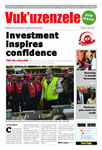
Translations:
Investment inspires confidence
Investment inspires confidence lebangThe R6.1 billion investment by Toyota, one of the country’s largest car manufacturers, will grow the local economy and create jobs.
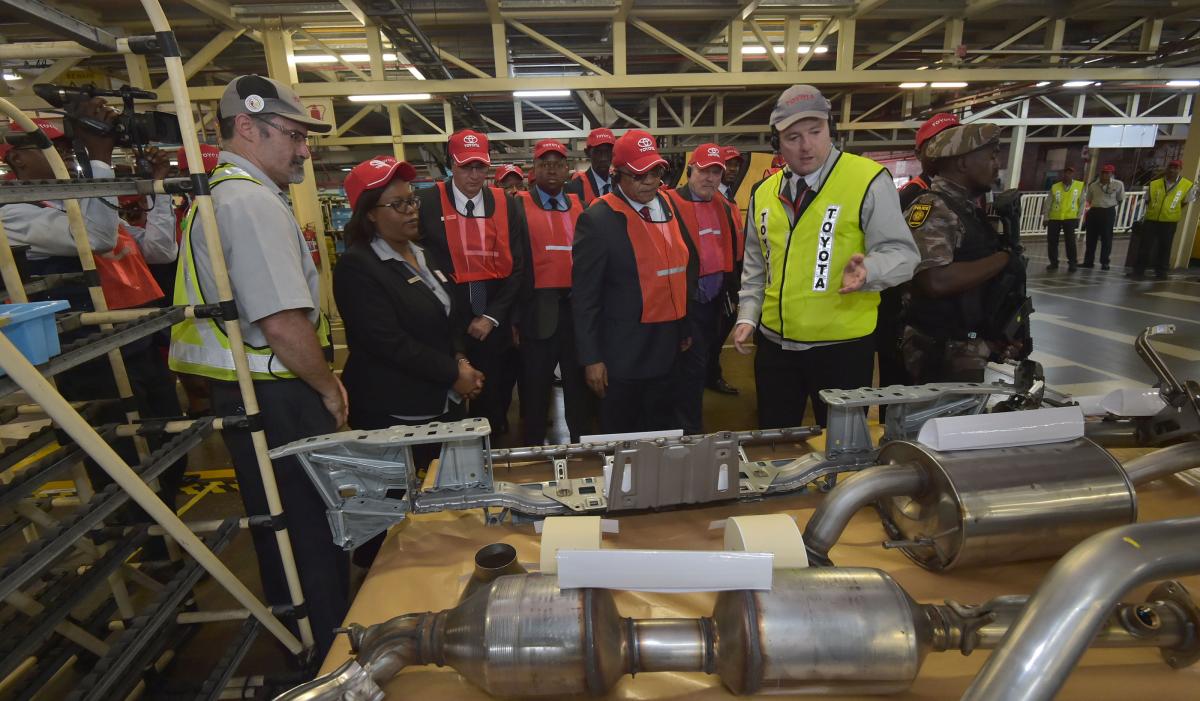 Car manufacturer Toyota has invested over R6 billion into South Africa by opening a plant to produce the new Hilux and Fortuner models in Durban, KwaZulu-Natal.
Car manufacturer Toyota has invested over R6 billion into South Africa by opening a plant to produce the new Hilux and Fortuner models in Durban, KwaZulu-Natal.
The production of the new models supports more than 4 000 jobs while total employment in the plant exceeds 8 000 jobs.
Speaking at the launch of the locally-produced Toyota models, President Jacob Zuma said the investment demonstrates confidence in South Africa’s economy.
“This is a significant contribution towards dealing with the serious challenge of unemployment in our country. This investment clearly demonstrates the confidence that global automotive producers continue to have in South Africa as an investment destination and the supportive policy environment which we offer.”
The President said government has taken a conscious decision to support the country’s automotive sector.
“The support provided by government through the Department of Trade and Industry (dti) has attracted investments of over R25 billion in the automotive industry in the past five years,” said President Zuma.
He said South Africa’s motor industry has been one of the key successes of government’s economic policies.
“Since 1995, exports have more than doubled, rising from just over 240 000 units to 615 000 vehicles in 2015. Given the current global economic slowdown, we decided to launch the Nine Point Plan to reignite growth, which was announced in the 2015 State of the Nation Address.”
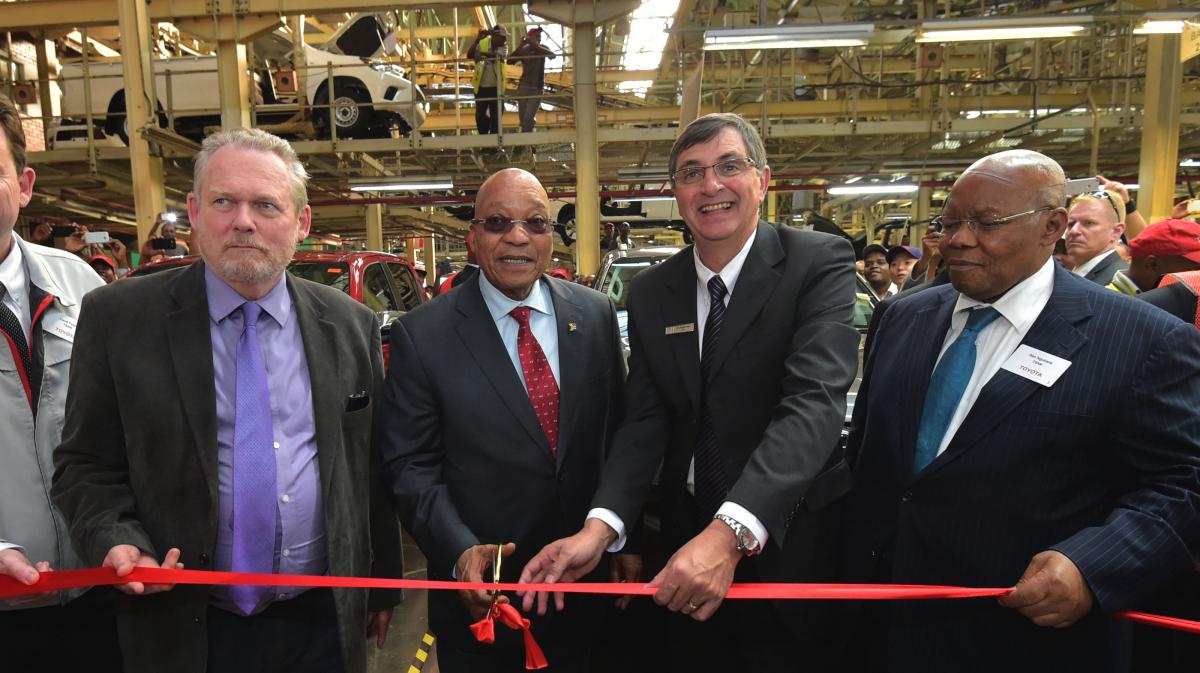 One of the pillars of this plan is a higher-impact Industrial Policy Action Plan (IPAP). The eighth phase of IPAP was launched by dti Minister Rob Davies earlier this month and focuses on increasing manufacturing, creating jobs and export intensity.
One of the pillars of this plan is a higher-impact Industrial Policy Action Plan (IPAP). The eighth phase of IPAP was launched by dti Minister Rob Davies earlier this month and focuses on increasing manufacturing, creating jobs and export intensity.
“Work towards the development of a new Automotive Plan to cover the period 2020 to 2035 has also commenced, with a target completion date of March 2017,” said President Zuma.
Toyota SA CEO Andrew Kirby said the investment would develop supplier capacity and create a platform for sustainable growth in the country as a strategic export base for the car maker.
We have evolved into the largest manufacturer in Africa and we produce the largest variety of models in the country,” he said, adding that this year, the company will export 55 000 new Hilux and Fortuner vehicles to 74 countries.
News in brief
News in brief lebangGauteng to build 50 000 houses
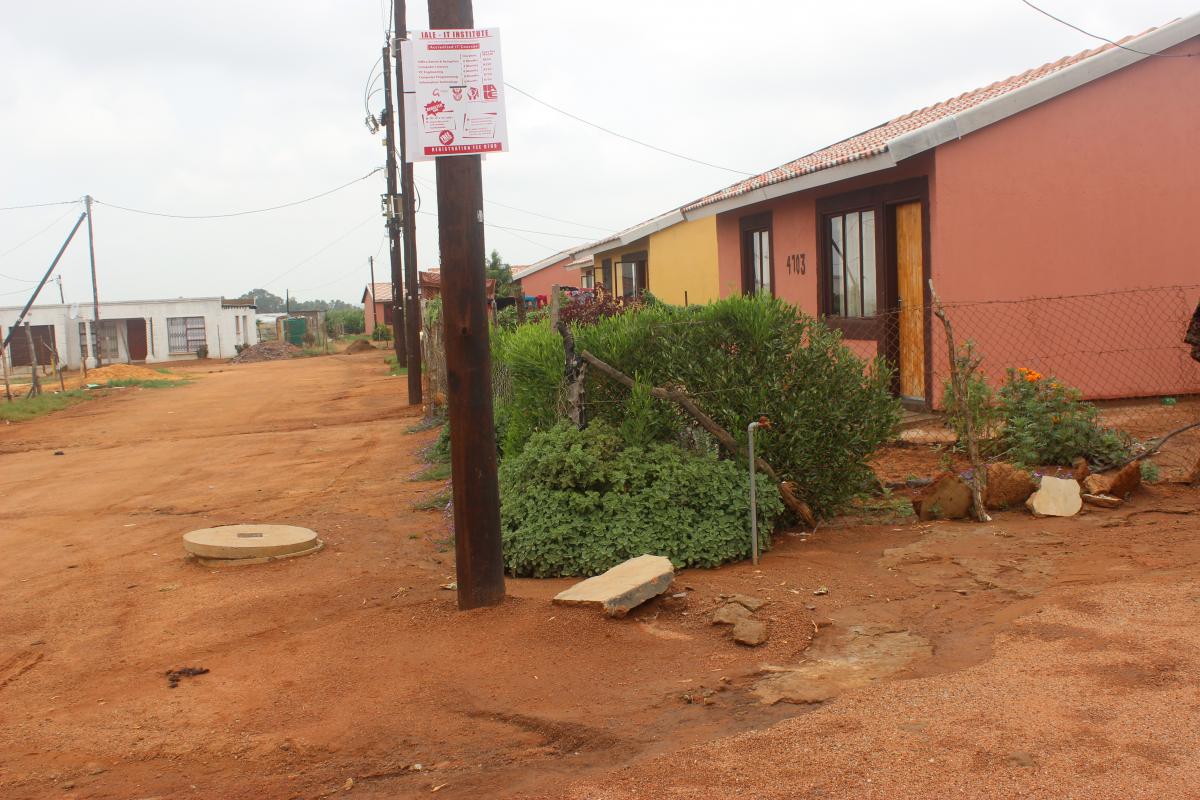
“… victory in the establishment of Mega Cities in this great province is most certainly within sight,” MEC Mashatile said when unveiling the department’s budget of R5.9 billion recently.
The department is at various stages of planning and implementing at least six big city developments across the province including Boiketlong and Vaal River City in the Southern Corridor, Fort West in the Northern Corridor, Leeuwpoort in the Eastern Corridor, Lanseria City in the Central Corridor, Alex City in the Central Corridor, Syferfontein City in the Western Corridor and Savannah City in the Southern Corridor.
Tomatoes to grow Modjadjiskloof
A new R100 million plant in Modjadjiskloof, Limpopo, is set to create jobs in the area.
The Dursots & All Joy Tomato Processing Plant was launched by Trade and Industry Minister Rob Davies recently.
It employs 70 people, with 200 more jobs for locals to be created in the next two months.
“With the launch of the processing plant, the company will create over 300 jobs by the end of the year,” said All Joy Foods founder Marci Pather.
He said the company will source 15 000 tons of tomatoes from 14 emerging farmers, creating much-needed jobs.
Make the right choice
Make the right choice lebangFrom the Union Buildings
As we prepare for election day on 3 August, South Africans must use the time to, not only appreciate the right to vote, but to choose to do what is right to promote peace and tolerance within our communities.
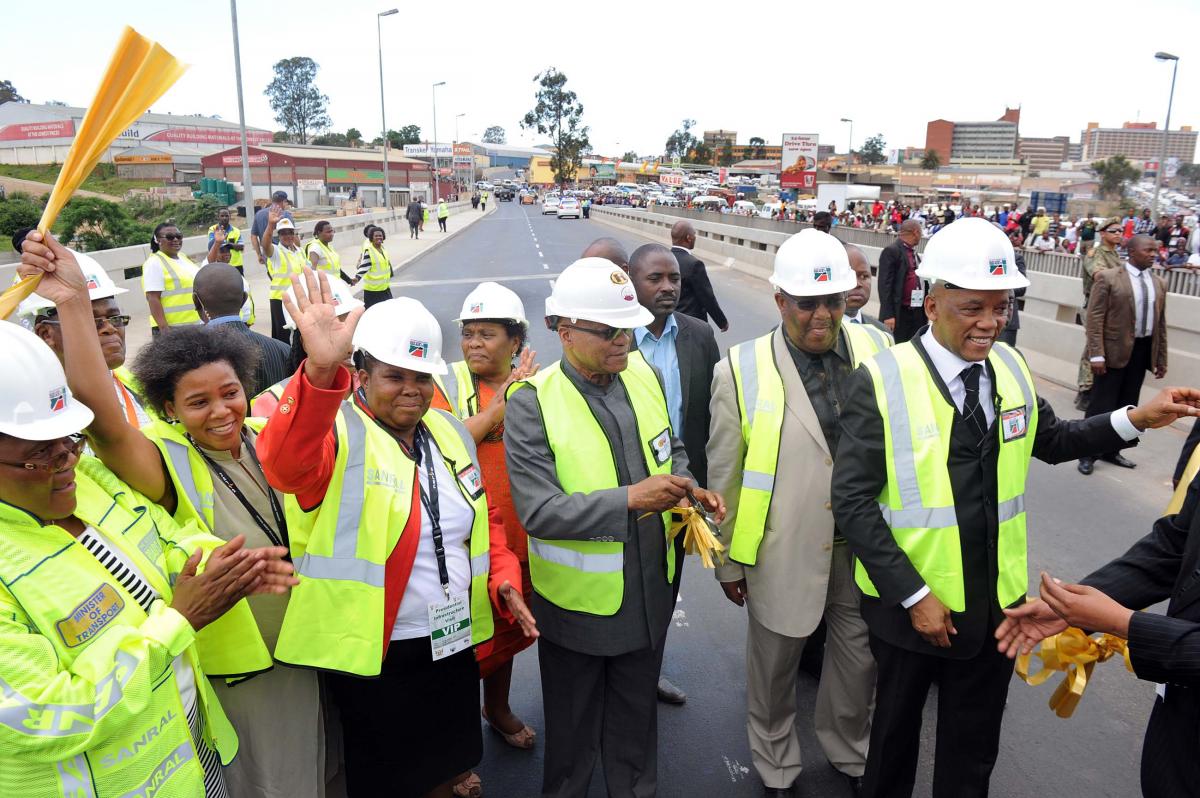 It was a very special occasion for me recently to join leaders of all political parties contesting the August 3 local government elections in signing the Electoral Code of Conduct of the Independent Electoral Commission.
It was a very special occasion for me recently to join leaders of all political parties contesting the August 3 local government elections in signing the Electoral Code of Conduct of the Independent Electoral Commission.
My signature and that of other political leaders signified our shared hope and expectation that the August elections will be free and fair, and that it will add to our country’s proud history of peaceful elections.
This record is particularly impressive, in view of the fact that this record was first established in 1994 as part of our transition to democracy, after decades during which the majority of South Africans were barred from democratically choosing the country’s – or their municipality’s - leadership.
As South Africans, we are a very vocal nation. We are people who don’t sit on the fence easily. All of us have our views on just about everything, and our views are very strong.
All of this is very good for the maintenance of a robust, competitive democracy.
But what is not good for the maintenance of a robust, competitive democracy, are extreme views and extreme actions that impact on the rights and security of those who disagree with any of us.
Recently, I have been troubled, like millions of South Africans, by the acts of violence that have plagued communities in places like Vuwani in Limpopo and Hammanskraal in Gauteng or even commuters exposed to violence among taxi operators transporting passengers to the Mall of Africa in Midrand.
Group conflict often attracts news headlines, pushing into the shadows of publicity those incidents of violence in which South Africans tragically violate one another one-on-one, with no cameras, notebooks or hashtags to tell their dreadful stories.
For its part, government has a clear programme of reaching out to communities in all parts of the country all of the time to listen and respond to the concerns of citizens.
We also use these opportunities to see how citizens themselves are improving their own lives and those of the community around them. We do so because government does not have all the resources or all the ideas we need to move South Africa forward.
As President, I hold several public meetings per year as well, including the Presidential Siyahlola Monitoring Programme where I undertake hands-on monitoring of service delivery in communities.
We also have the Presidential Imbizo programme of listening to communities and the Presidential Infrastructure Programme where I meet communities when I open infrastructure projects. The Deputy President also holds many meetings yearly focusing on the fight against poverty amongst others.
Government also holds public meetings where ministers and deputy ministers visit communities and have very detailed engagements where people can share their views and express their frustrations.
A report is presented by The Presidency at each Cabinet Lekgotla detailing the public engagements activities of each Minister and Deputy Minister every six months. The report for January to July 2015 to the mid-year Cabinet Lekgotla, indicated that over 700 events were held by members of the National Executive supported by premiers, MECs and mayors. The report for July to December 2015 recorded over 600 izimbizo events having been undertaken by Ministers and Deputy Ministers.
In addition, government hosts various hotlines where citizens can tell us confidentially or identifiably where their expectations are not being met or where wrongdoing is occurring.
Citizens also have access to council meetings and committee meetings in provincial legislatures and our national Parliament.
All of these platforms allow citizens to engage openly with government, and there is therefore no need to resort to unlawful actions, including violence against people or property, to attract the interest or attention of government.
As we prepare to go to the polls on August 3, we must all value the opportunity that the election will give us to make our political choices and, through that, pave the way for development in all municipalities.
However, election day is not the only day on which we need to think about the choices we make.
We must do the right thing every day, particularly on days when lawless, disruptive and sinister people try to create chaos and violence in our communities; people whose often unknown motives lead to the destruction of infrastructure and services on which government – and therefore the people of South Africa – spent millions or billions of rand.
We cannot allow such elements to rob especially poor communities of valuable public assets and services.
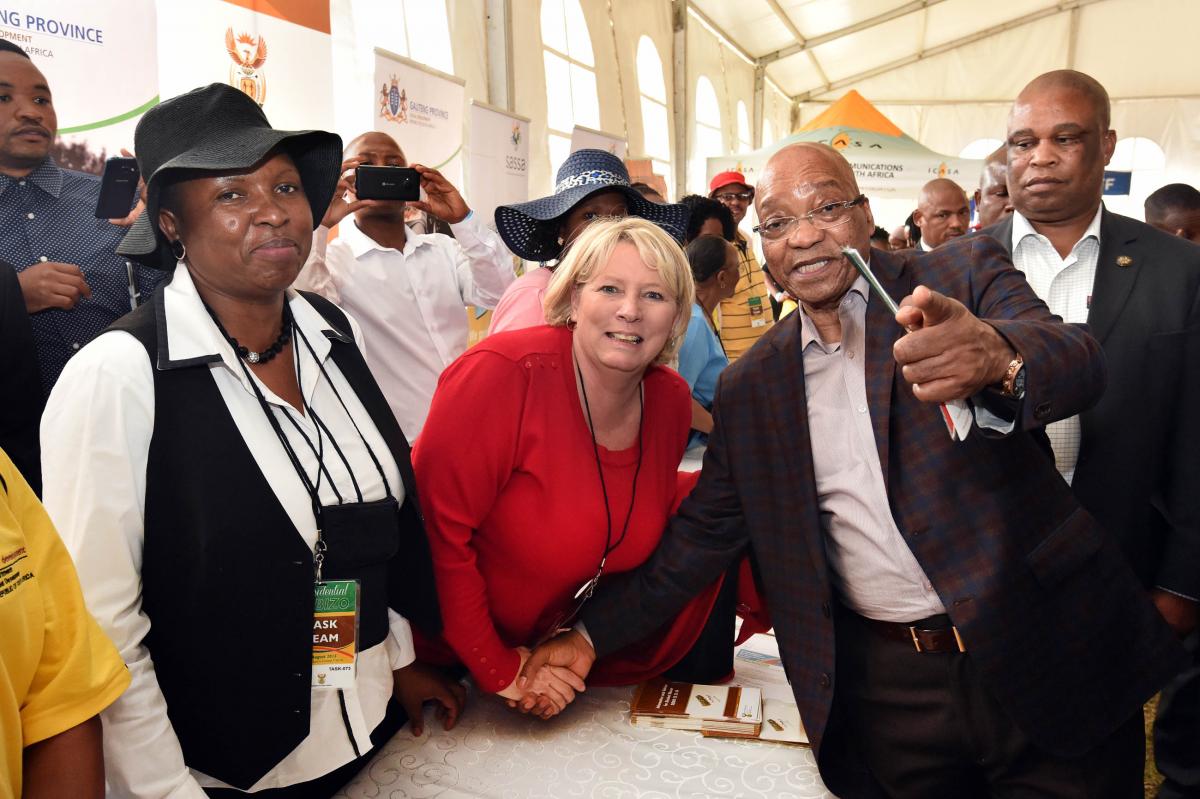 The violence that may attract publicity does not attract opportunities or development. It simply slows down the progress all of us are trying to achieve.
The violence that may attract publicity does not attract opportunities or development. It simply slows down the progress all of us are trying to achieve.
All of us need to promote peace and tolerance, and spend time listening to one another more than trying to silence one another.
We need more tolerance, not more terror, in our lives and in our homes, workplaces, places of worship and shared public spaces.
Intolerance, racism and violence have no place in a democratic and free South Africa.
It is up to each of us to work for peace and prosperity in our country. We need to do so, not just for August 3, but for all the generations to come in our bright future.
Vuk’uzenzele celebrates 100th edition
Vuk’uzenzele celebrates 100th edition lebangEditor's message
Government Communication and Information System (GCIS) is pleased to present to you, our valued reader, the 100th edition of the newspaper.
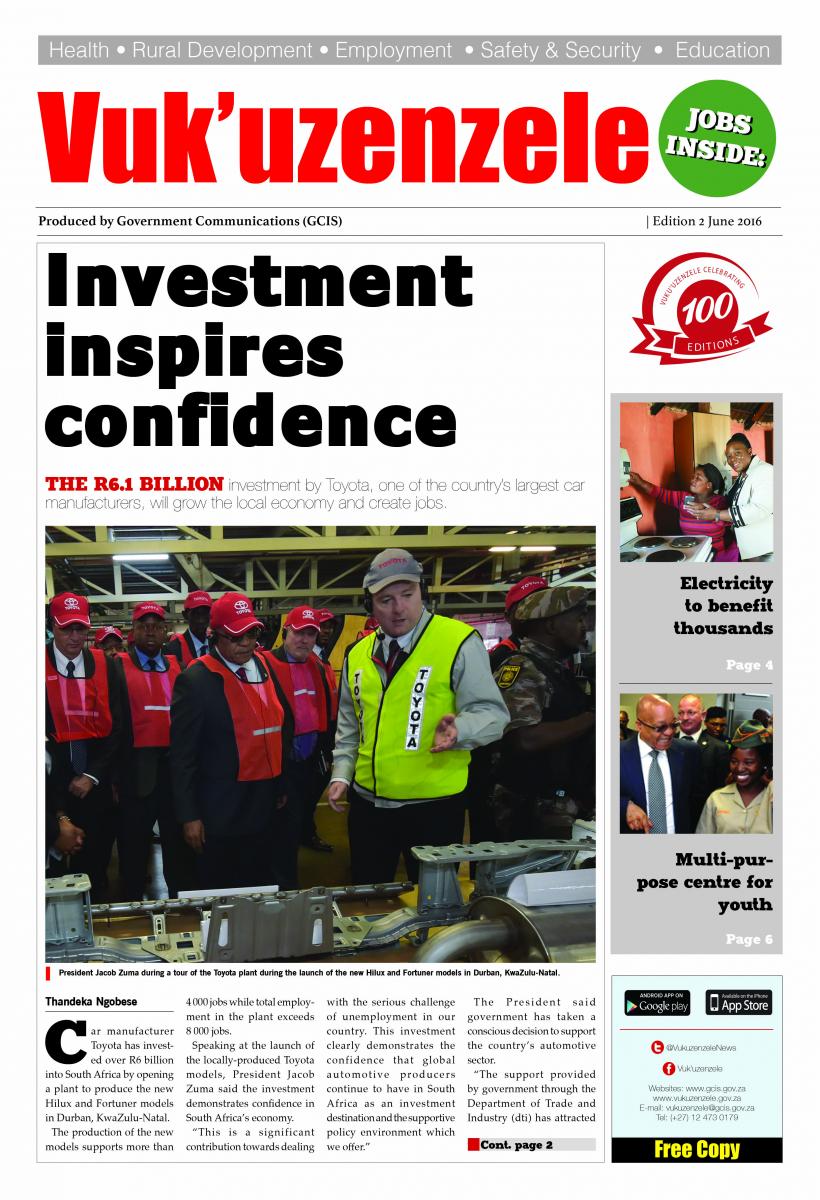 As promised in the previous edition your favourite paper now has a fresh new look. This refreshed newspaper is a celebration of the journey we have travelled with you, the loyal reader, over the past 99 editions.
As promised in the previous edition your favourite paper now has a fresh new look. This refreshed newspaper is a celebration of the journey we have travelled with you, the loyal reader, over the past 99 editions.
Since we started with the production of Vuk’uzenzele we have never looked back.
The first edition hit the streets in October 2005, in a magazine format. Since then, Vuk’uzenzele has changed its format and appearance and continues to make huge strides in communicating government’s programmes and policies to all South Africans.
The newspaper was established with the sole purpose of making government information available in a simplified manner to the people of South Africa, particularly those who don’t have access to government news.
Vuk’uzenzele aims to provide news and information to all South Africans and as such, a lot of effort goes into ensuring that it is distributed to those in the rural areas, in particular, where access to information is scarce.
In 2011, Vuk’uzenzele changed from being a magazine produced every second month to a newspaper produced once a month. In the same year, the newspaper also carried a special four-page Employment News supplement focusing on job creation and skills development related articles and government recruitment advertisements in the public sector.
Five years later, we continue to evolve. Vuk’uzenzele now consistently carries government jobs. The newspaper has also changed its cycle from once a month to every fortnight to bring you current and fresh news.
Moving with the times
In this 100th edition (and in future), we are bringing you a much cleaner design, short and to the point stories, bolder headlines and more exciting pictures. We continue to carry a message from President Jacob Zuma, as well as stories of ordinary people who are making a difference in their communities. Vuk’uzenzele will also continue to expose you to government programmes that are designed to change your life and move South Africa forward.
Fast facts
To date the newspaper has produced a total of 162.25 million copies. The paper also boasts the largest print run within the newspaper industry.
It is also available in Braille to cater for the visually impaired. To date, 51 251 Braille copies have been produced.
Vuk’uzenzele is partially translated in all official languages to ensure that you the reader can also receive government news in the language of your choice.
Vuk’uzenzele is also available online www.vukuzenzele.gov.za and from your App Store and Android App on Google play.
We will continue to strive to bring you government news more frequently.
Enjoy the read and remember to give us feedback.
Facebook and Twitter
Let’s hear your views! Follow us on Twitter and like our Facebook page
Electricity to benefit thousands
Electricity to benefit thousands lebangLocal government
As part of government’s massive Comprehensive Development Programme the KwaZulu-Natal (KZN) Department of Cooperative Governance and Traditional Affairs will provide electricity to 1 200 rural households.
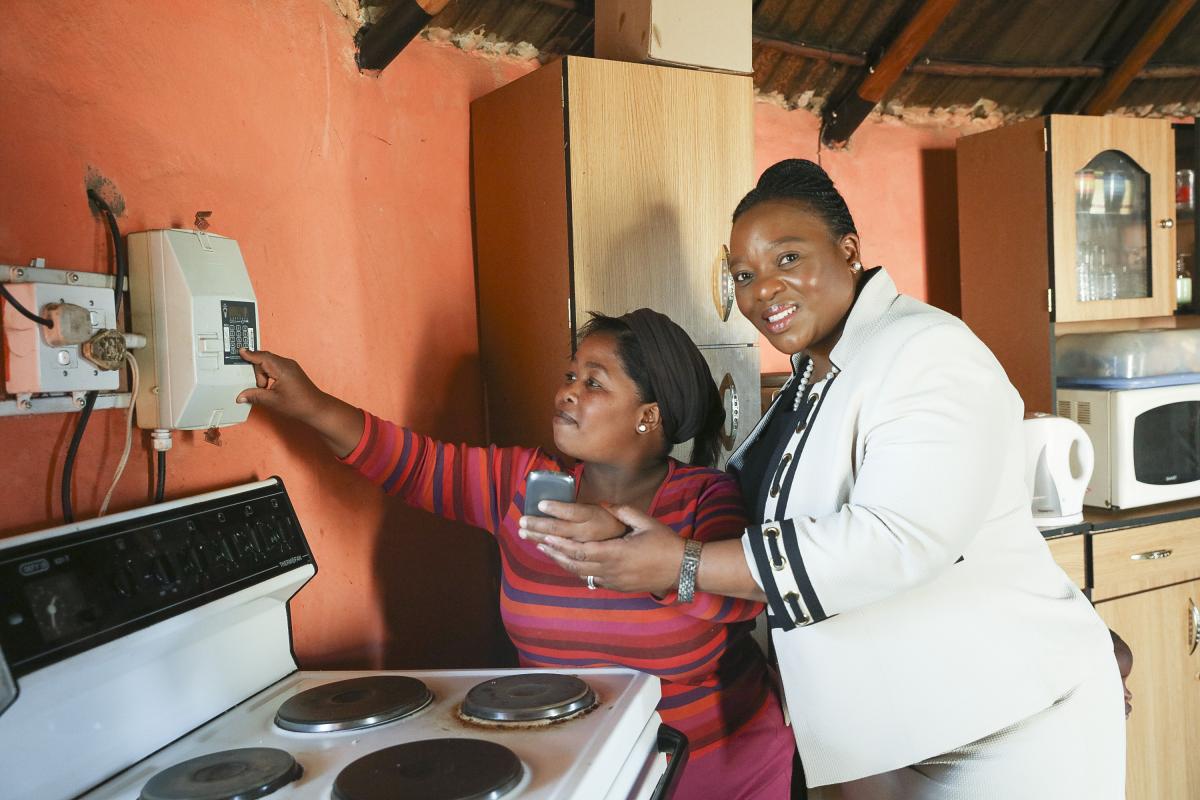 About 10 000 people will benefit from this multi-million rand effort to give rural municipalities basic services.
About 10 000 people will benefit from this multi-million rand effort to give rural municipalities basic services.
One of the communities to benefit is the town of Ndwendwe. The (KZN) government is unfolding a R19 million electrification project in the area.
The Comprehensive Rural Development Programme deals with issues such as underdevelopment, food security, unemployment, poverty and other social ills which have become synonymous with rural areas.
Electricity changes lives
Electricity changes lives lebangLocal government
Zibuyisile Ngcobo (65) of Sonkombo in the town of Ndwedwe, KwaZulu-Natal, thought she would never have access to electricity.
“I was getting worried that I might die without ever having electricity in my home, but the government came through for me and my family and we can now experience the convenience of modern life.
“The days when we had to walk into the forest in search for firewood are a thing of the past and our children can now study in the safety of electric lights,” she said.
Another beneficiary Nontshisekelo Bhengu (45) says they used to watch TV only when they visited relatives in urban areas.
“We can now watch TV in our own homes. We used to spend R42 for transport just to charge our phones in Verulam. Having our electricity is a huge relief for us. We thank the government for providing us,” she said.
Addressing community members MEC Nomusa Dube-Ncube urged citizens to report suspected electricity theft which affects government’s ability to provide electricity to other communities.
“As a community you now have the responsibility of ensuring that you use electricity wisely and that no one makes any illegal connection or tries to bypass the meters because the money you pay goes towards ensuring that Eskom continues to produce electricity,” said MEC Dube-Ncube.
Member of the Provincial Legislature, Sihle Zikalala, who is from Ndwendwe, thanked the local leadership for ensuring that the area has access to electricity and reminded the community of the dangers of illegal electricity connections.
Fast Facts
Never overload electrical outlets by plugging in too many plugs.
Tshwane gets tough on drugs
Tshwane gets tough on drugs lebangLocal government
The City of Tshwane is spending millions of rands fighting drug abuse after a continued influx of Mandrax, Nyaope and other drugs.
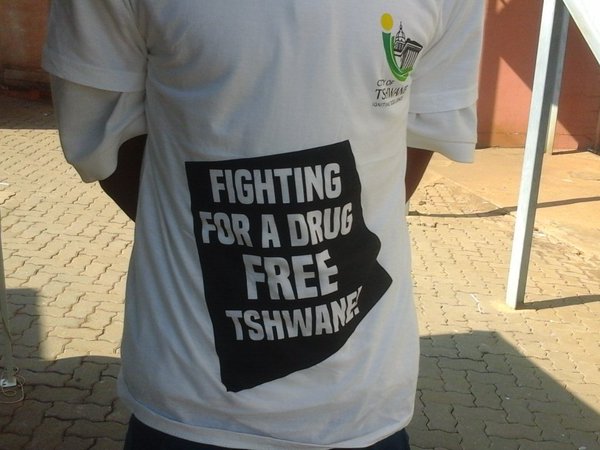 “We are aware that Tshwane has been labelled the drug capital of South Africa and this led to us allocating R50 million to tackle the problem in the 2015/16 financial year,” said Tshwane Executive Mayor Kgosientso Ramokgopa.
“We are aware that Tshwane has been labelled the drug capital of South Africa and this led to us allocating R50 million to tackle the problem in the 2015/16 financial year,” said Tshwane Executive Mayor Kgosientso Ramokgopa.
With the financial year drawing to a close, the R15 million not yet spent will be added onto other, yet-to-be-allocated funds to supplement the city’s existing initiatives to combat substance abuse. A percentage will go to rehabilitation centres and social welfare organisations.
Ramokgopa said that despite the underspending, he is happy with what the city was able to achieve, adding that more funds will be injected into fighting drugs in the next financial year.
He said the money will assist in empowering ward-based drug action committees, which address drug problems and offer counselling and support for addicts.
So far, the city has established 48 local drug action committees in areas such as Soshanguve, Mabopane, Winterveldt, Ga-Rankuwa, Hammanskraal, Atteridgeville, Olievenhoutbosch, Cullinan and Mamelodi.
While the city has pledged to establish the equivalent of a narcotics unit within the Tshwane Metro Police, efforts to clamp down on the manufacturing and distribution of drugs are ongoing.
“We have committed ourselves to conducting sporadic raids in drug distribution hotspots.”
The Executive Mayor also announced plans for an awareness campaign aimed at the youth called ‘Tswa Daar’, which means ‘stop it’.
According to Ramokgopa, the ultimate goal is not only to win the fight against drugs but to also have drug users completely rehabilitated.
“Although we are not catching the big fish, we are making arrests and are slowly making progress in this regard,” said Ramokgopa.
For more information: Email: idac@tshwane.gov.za or visit: www.tshwane.gov.za
Skills centre for the youth
Skills centre for the youth lebangYouth matters
A newly-opened all-in-one centre is set to empower Central Karoo young people, before being rolled out nationally.
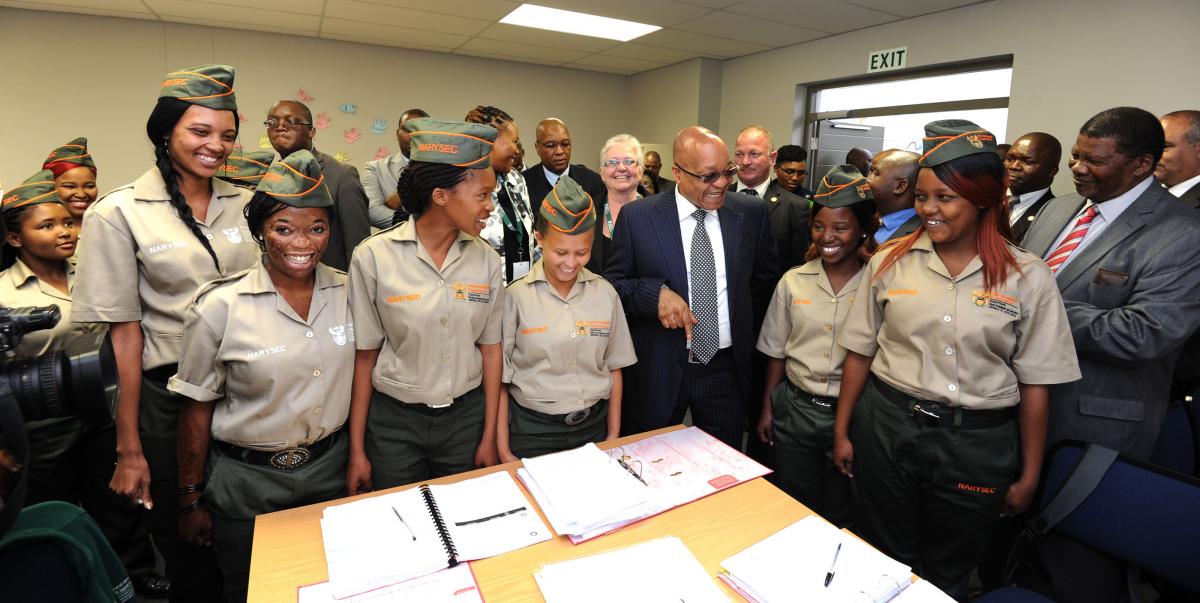 President Jacob Zuma recently opened a first-of-its-kind multi-purpose centre in the Western Cape’s Central Karoo.
President Jacob Zuma recently opened a first-of-its-kind multi-purpose centre in the Western Cape’s Central Karoo.
Local young people were involved in building the Beaufort West Youth Hub, which was completed in April 2015. The skills they learnt will not be lost as a co-operative will now be formed to carry out maintenance work on the youth hub.
Speaking at the hand-over ceremony, the President said he dedicated the centre to the countless young people who sacrificed their lives to ensure that today’s generation and generations to come enjoy freedom and democracy.
The dedication was made all the more poignant by the fact that this is the 40th anniversary of the 1976 uprisings.
Construction of the hub started in 2012, with the sod-turning ceremony taking place on Mandela Day of that year. Rural Development and Land Reform Minister Gugile Nkwinti said then that the development would serve as a pilot project and would eventually be rolled out to other provinces.
“…as government, the challenges facing the youth, such as unemployment, are our gravest concerns.
“While the conditions for the youth are improving in the country, the Social Profile of Youth report suggests that black youth in particular are still faced with many challenges with regard to absorption into the labour market, compared to their white counterparts,” said President Zuma.
The facilities at the hub include a fully-equipped skills centre operated by South Cape College to provide training in business administration, end-user computing and early childhood development to 200 National Rural Youth Service Corps participants per year.
There is also an amphitheatre and a refurbished community hall that will be open to the larger community.
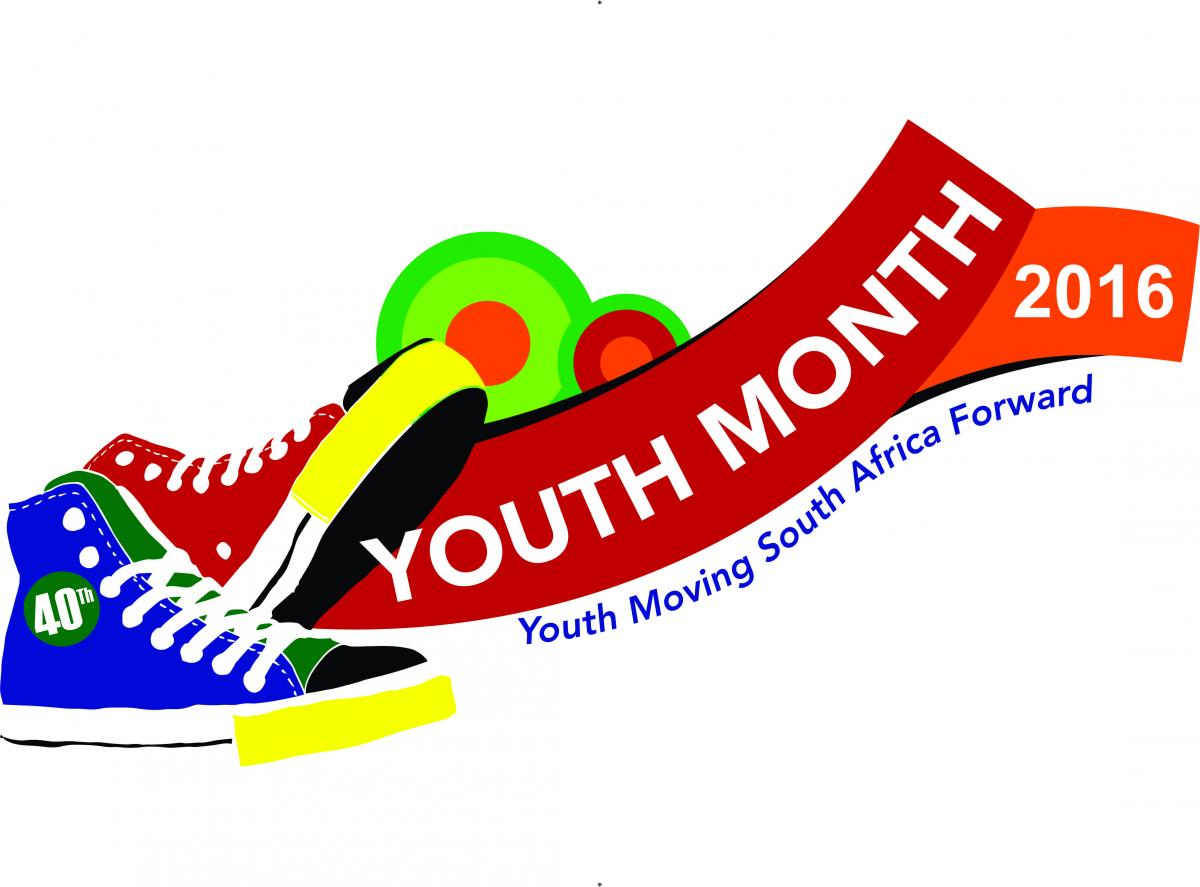 President Zuma said the hub’s ICT centre will help community members access free high-speed internet and information technologies which will assist in integrating them with the larger global information community.
President Zuma said the hub’s ICT centre will help community members access free high-speed internet and information technologies which will assist in integrating them with the larger global information community.
The hub is also equipped with world-class sport and recreation facilities that will offer people a chance to explore different sports and help transform South Africa’s various sporting codes.
The half Olympic-sized swimming pool will host swimming clubs and competitive galas, while the gymnasium is fitted with equipment comparable to the best private gyms, courtesy of the Virgin Active Group.
“This gym shows what can be done when government and the private sector form partnerships to develop poor communities,” said President Zuma.
Operation Phakisa trains artisans
Operation Phakisa trains artisans lebangYouth matters
Transnet has announced that it will spend R7.7 billion on training as it drives to meet capacity requirements in line with its Market Demand Strategy (MDS). As part of this initiative, the Transnet National Ports Authority (TNPA) has selected 18 candidates from the South Durban Basin for Operation Phakisa technical training.
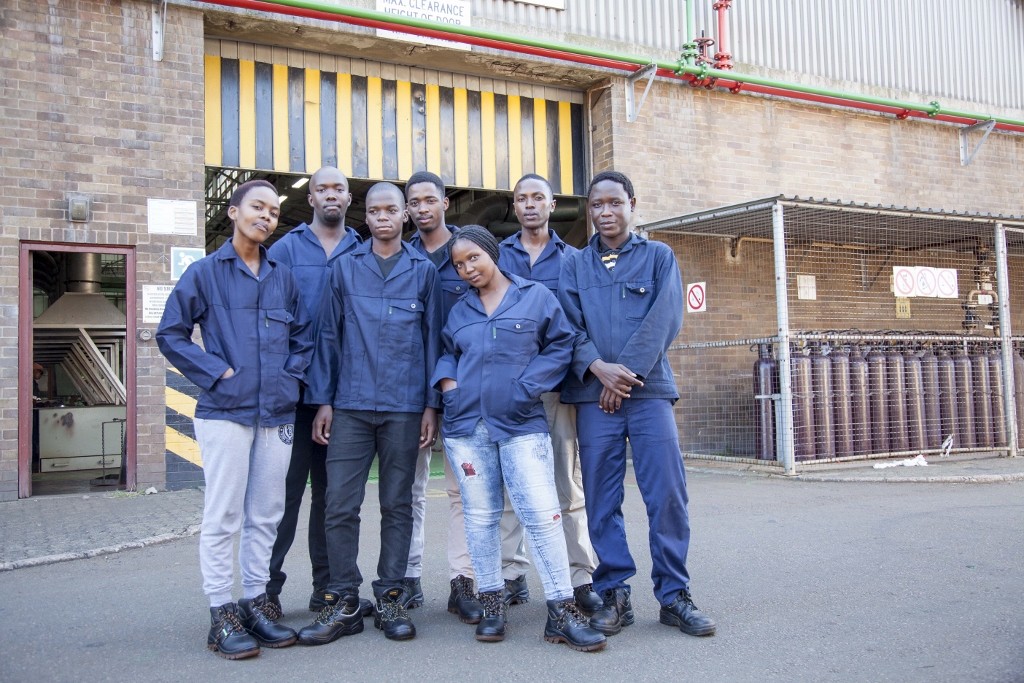 The training forms part of Transnet’s MDS to train artisans for the shipbuilding and repair industry and is in line with Operation Phakisa, which aims to unlock the potential of the oceans economy.
The training forms part of Transnet’s MDS to train artisans for the shipbuilding and repair industry and is in line with Operation Phakisa, which aims to unlock the potential of the oceans economy.
TNPA’s Port of Durban has adopted 15 schools in the South Durban Basin and has various programmes in place aimed at developing mission critical skills within its communities from the ground up.
The Operation Phakisa technical training programme consists of two, three-year courses – Millwright and Coded Welding – run by the Transnet School of Engineering and a course on spray painting that will take place later during the year.
Being a part of TNPA’s Operation Phakisa technical training course for Vuyani Chiya (23) is more than an opportunity to further his education, it is the means through which he hopes to change both his life and that of his mother.
Chiya who has been living in the South Durban Basin while he studies towards his N4 and N5 certificate at Umlazi Computech, is now working towards qualifying as a millwright.
“To be selected for this course, is a dream come true. I will study hard to fulfil my dream. We thank Transnet for those of us who come from disadvantage backgrounds,” he said.
A millwright installs, repairs, reassembles and moves machinery in factories, power plants and construction sites. Capacity-building Manager for the KZN region at the Transnet School of Engineering Thandukwazi Magcaba said the skills training programme was a great opportunity for the students and for the country.
“Programmes such as these are incredibly important. I would say any country without properly trained artisans is lagging behind because, in some sectors, we do not have our own artisans and these individuals are imported. However, with programmes such as this in place, we can cut down on the amount of imports, harness job creation and move our unique projects forward.”
Each course is made up of three phases. In the first, the apprentices are taught basic tooling; in the second, they familiarise themselves with the equipment they will be working with/on; and in the final phase, the students work practically and are tested accordingly.
The success of the training programmes offered by the school, said Magcaba, is indicated by the increase in entrant numbers each year.
“When I first started here five years ago, we had 290 students. Now we have 539 – nearly double that number. It is very rewarding to know that we are helping to bring about positive change.”
For more information: www.transnet.net
SA’s youth need a ‘hand up’
SA’s youth need a ‘hand up’ lebangYouth matters
On 16 June we commemorated the 40th anniversary of the 1976 youth uprising and sacrifices made by people of that generation to build a democratic country.
 There have been many gains since 1994 but the youth of South Africa remain affected by many desperate issues such as poverty, inequality and unemployment.
There have been many gains since 1994 but the youth of South Africa remain affected by many desperate issues such as poverty, inequality and unemployment.
More needs to be done to promote dignity and development among the youth.
National Youth Development Agency
The National Youth Development Agency (NYDA) was established as a single, unitary structure addressing youth development issues at national, provincial and local government level.
The NYDA plays a leading role in ensuring that major stakeholders such as government, the private sector and civil society, prioritise youth development and contribute towards identifying and implementing lasting solutions to youth development challenges.
In April 2013, business, government, labour, civil society and non-governmental organisations signed the Youth Employment Accord to improve the equipping and placement of young people in jobs.
The Youth Employment Accord’s objectives are aligned with governments various efforts to support economic transformation. The aim is also to make the economy sensitive to young people’s employment needs and create five million jobs for the youth by 2020.
Government’s support for the NYDA is ongoing. The Presidential Youth Working Group, led by Deputy Minister in The Presidency Buti Manamela, is focusing on youth matters to improve the coordination of stakeholders and youth formations.
Another critical achievement is the amendment of the National Youth Policy (2009-2014) and adoption of the National Youth Policy (2015-2020). The policy’s focus is on economic participation, transformation, education, skills development, healthcare and combating substance abuse, nation building and social cohesion.
Achievements
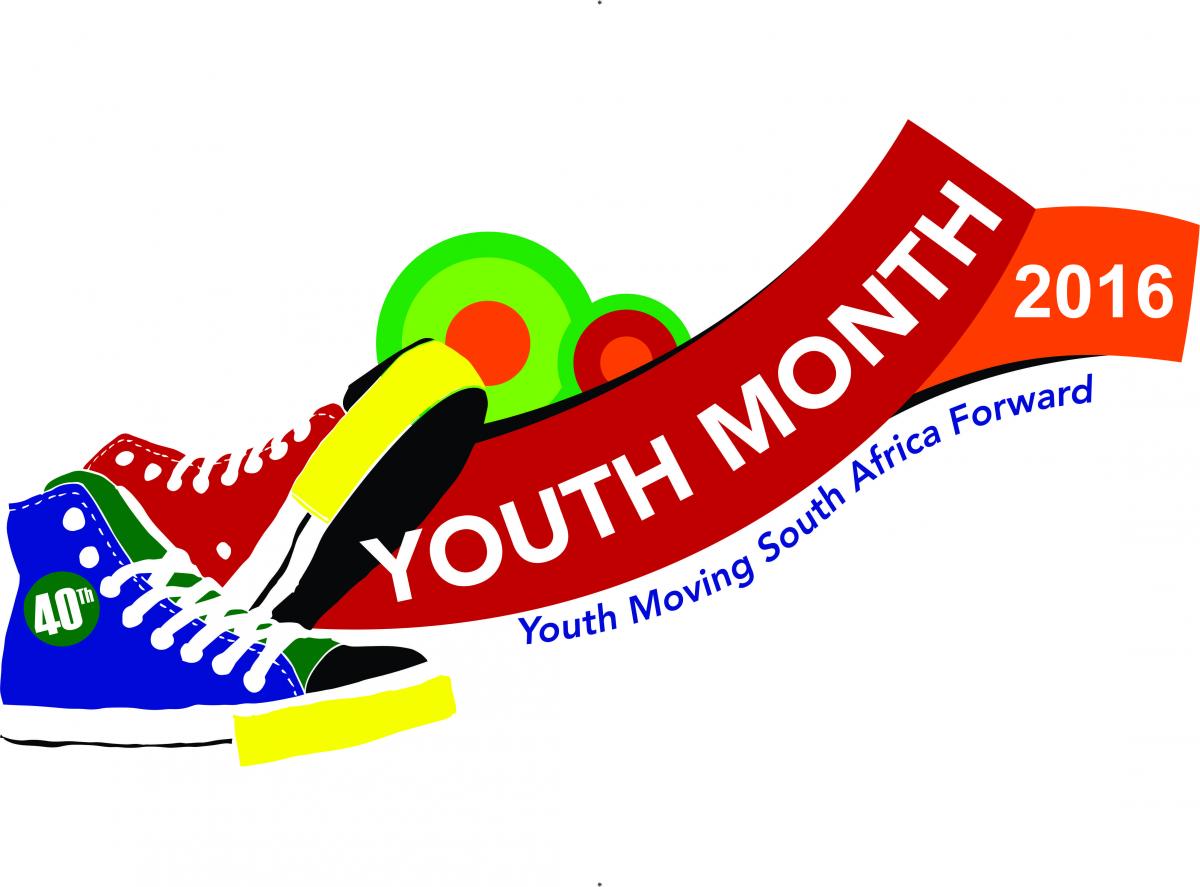 The NYDA is changing its focus to better serve the youth. Recently, the NYDA achieved its first ever clean audit and was declared fully complaint.
The NYDA is changing its focus to better serve the youth. Recently, the NYDA achieved its first ever clean audit and was declared fully complaint.
To become a credible and capable development agency, the NYDA shifted its core business from enterprise finance towards education and skills development. The biggest change was to convert from providing loans to awarding grants to young entrepreneurs.
The numbers tell a story of improved service delivery. However, the needs of the youth exceed the NYDA’s capacity. Collaboration with all sectors of society is necessary.
It is critical to harness the potential presented by the youth and use it to the advantage of our country’s growth and development. We have begun writing a different story: one of hope, determination, productivity and success. At the centre of this new story is a determined and empowered youth.
The youth of this country have said that they don’t want a ‘hand down’ but need a ‘hand up’. Help them to realise their full potential.
During 2014/15 the NYDA achieved the following:
- 1 034 youth-owned enterprises received NYDA Grant Funding resulting in 4 343 jobs.
- 62 916 entrepreneurs were supported through the NYDA Business Development Support services.
- 5 319 young people were enrolled in the NYDA 2nd Chance Matric Rewrite Programme.
- 300 youth were supported through the Solomon Mahlangu Scholarship Fund.
- 937 949 young people were supported through individual and group career guidance.
- 2 342 young people participated in the structured Youth Build programme.
- 12 490 young people were enrolled in National Youth Service (NYS) volunteer programmes.
- 57 412 young people were supported through the job-preparedness and life skills programmes.
NYDA Call Centre 0800 52 52 52
*Khathu Ramukumba is CEO of the NYDA.
Pitch-perfect entrepreneurs win
Pitch-perfect entrepreneurs win lebangYouth matters
Nine young entrepreneurs scooped R40 000 in seed capital each and access to valuable business development support and funding from the Mpumalanga Youth Entrepreneurship Programme (MYEP).
The MYEP is a partnership between the South African Breweries’ flagship enterprise development programme SAB KickStart and Mpumalanga’s provincial government.
The initiative also has the support of organisations that contribute to developing supporting young entrepreneurs in Mpumalanga.
These are the Mpumalanga Youth Chamber of Commerce and Industries SA, Gert Sibande Technical Vocational Education and Training College’s Centre of Entrepreneurship, the Small Enterprise Development Agency, and the National Youth Development Agency.
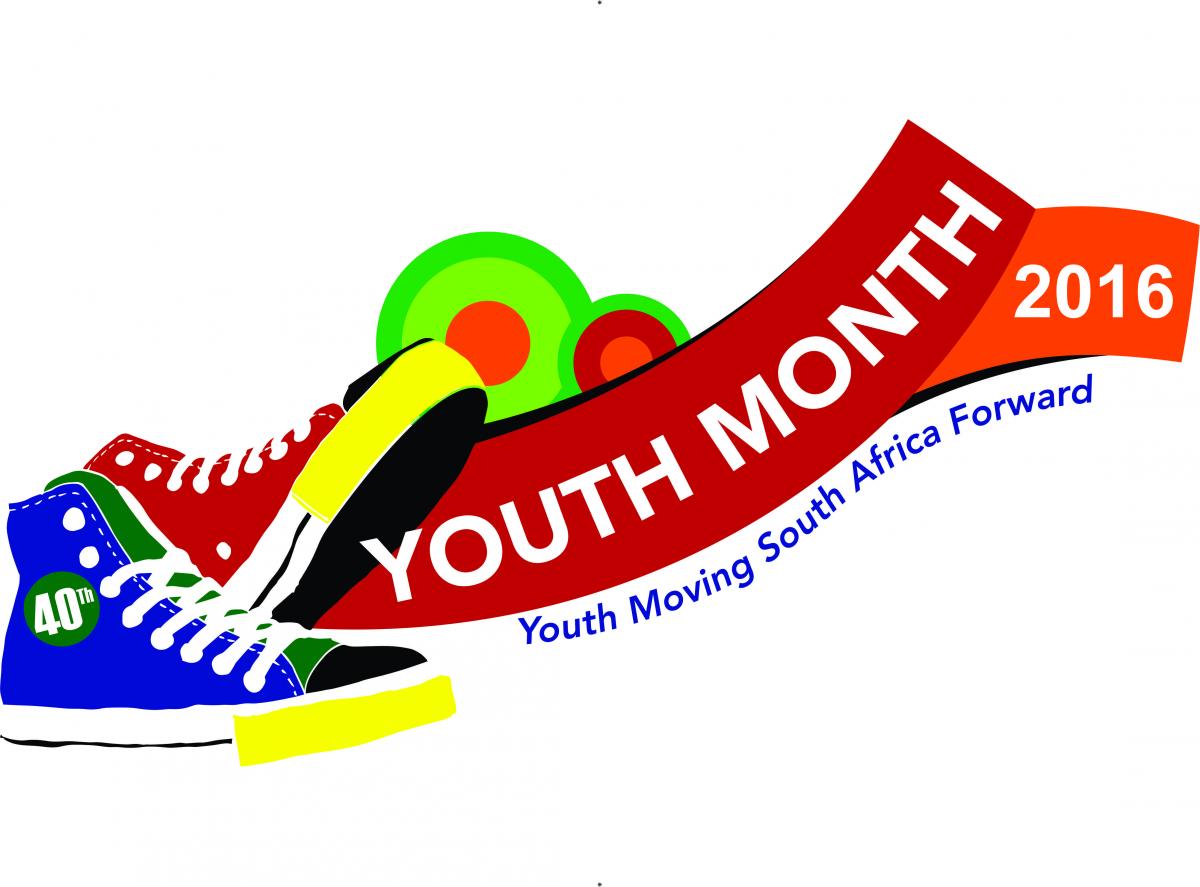 “We are working tirelessly to ensure that Mpumalanga youth are also given opportunities to advance their businesses and access opportunities that are available through our partnership with the private sector. We are pleased the youth of Mpumalanga have taken advantage of such opportunities to develop and grow their businesses,” said Lemmy Mdluli, Mpumalanga Economic Development and Tourism’s Chief Director: Integrated Economic Development Services.
“We are working tirelessly to ensure that Mpumalanga youth are also given opportunities to advance their businesses and access opportunities that are available through our partnership with the private sector. We are pleased the youth of Mpumalanga have taken advantage of such opportunities to develop and grow their businesses,” said Lemmy Mdluli, Mpumalanga Economic Development and Tourism’s Chief Director: Integrated Economic Development Services.
Besides seed capital the nine MYEP winners will enjoy high-level business mentoring and support.
The winners were selected from 150 participants chosen at live pitching clinics to attend one of three-day business boot camps held in the Gert Sibande, Nkangala and Ehlanzeni districts of Mpumalanga. Three winners were selected from each district.
“SAB’s enterprise development support is aligned with South Africa’s national economic development priorities and MYEP is another partnership that allows us the privilege of working with government to identify youth-owned businesses that will contribute to South Africa’s regional or national economic development and job creation,” said Simphiwe Mntambo, SAB Enterprise Development Specialist responsible for Youth Business.
Winners have support
Winners have support lebangYouth matters
Sifiso Suling Mathe and co-director Zinhle Loraine Mabizela recently won R40 000 in seed capital and access to business development support from a public-private partnership called the Mpumalanga Youth Entrepreneurship Programme (MYEP).
With the help of the MYEP the two go-getters from Bethal, Mpumalanga, will pursue solutions to challenges they face. These include theft, insufficient manufacturing space, and the need for business mentorship and funding.
Mathe and Mabizela registered Masande Designs and Construction Solutions (Pty) Ltd in December 2013 and started operating their brick manufacturing and construction services in 2015.
“Mzinoni Township where we lived was filled with old, red-brick houses that were falling apart. There was a gap in the market and we took it,” said Mathe.
Masande Designs and Construction Solutions now has two permanent and four part-time employees and manufactures bricks from recycled fly ash, sand and a special kind of cement that is ‘our secret recipe that gives our bricks extra strength’, according to Mathe.
It is the partners vision to service the entire Gert Sibande region by June 2017, and the whole of Africa in five years’ time.
Entrepreneur living his dream
Entrepreneur living his dream lebangYouth matters
Fondly known as Jahman, Knowledge Nkosi (28) started making security proofing while he was a learner at Ndlela Secondary School in his home town of Piet Retief, Mpumalanga.
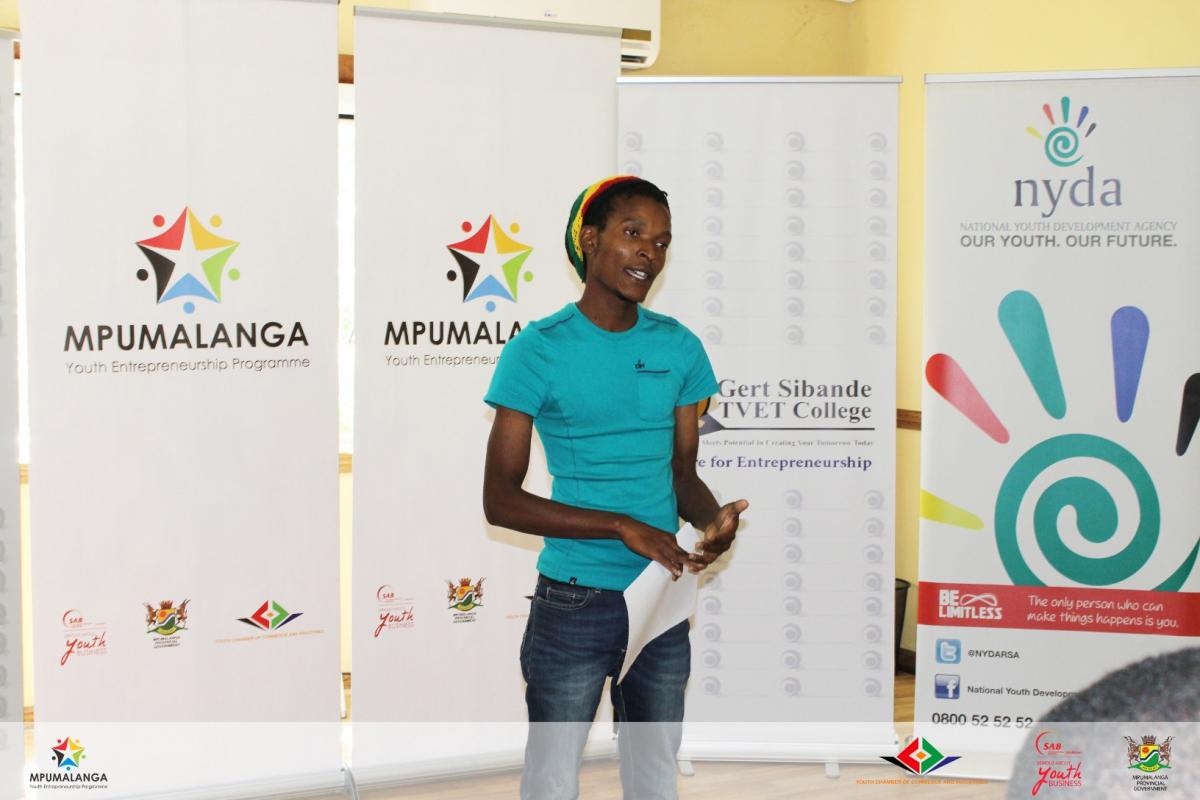 “I remember the day I started welding. I had to borrow machinery from my neighbour but did not have a safety helmet so initially tried to shield my eyes with a beer bottle. I was temporarily blinded and had to miss three days of school,” recalls Nkosi.
“I remember the day I started welding. I had to borrow machinery from my neighbour but did not have a safety helmet so initially tried to shield my eyes with a beer bottle. I was temporarily blinded and had to miss three days of school,” recalls Nkosi.
In the face of difficulty in 2005, Nkosi knew that he had to do something to change his family’s tough circumstances and help care for his younger sister.
He was in Grade 11 when he was forced to become an entrepreneur.
Today he is one of nine Mpumalanga Youth Entrepreneurship Programme (MYEP) winners.
Last year, he started making trailers too. Now situated in Elukwatini near Badplaas, Nkosenhle Investment and Trading manufactures lightweight commercial trailers, builds truck bodies and makes security proofing and gates.
“I started by building a single-axle luggage trailer which I posted on a leading buying and selling social media network,” he said, explaining that he had to help find a way to help pay for the family’s rent, electricity and other costs.
“It was and still is better than resorting to theft,” he added.
Nkosi said he is fortunate to be doing a job he loves. The MYEP’s support will help him realise his dream of growing his business into an entity that is well known across Africa and introducing “something new in the industrial sector of manufacturing”.
Struggling to secure start-up capital, Nkosi fortunately heard about the MYEP from the Elukwatini Youth Development Centre and Welile Ntlebi of the National Youth Development Agency.
Nkosi’s mentor is Charles Marivate, his neighbour and former high-ranking police official.
“He believed in me, saying: ‘You will never know a person’s ability unless you give him a chance’.”
Mpho Sadiki, SAB’s Head Sustainable Development and Transformation, said: “By supporting youth entrepreneurship in South Africa, SAB is contributing to the country achieving its national economic development priorities. Partnerships like MYEP allow us to assist government in growing sustainable youth businesses.”
Nkosi encouraged other young people to play their part in changing their circumstances.
“To all the youth out there on the street corners, I say wake up; it is time to live your dream.”
Fast fact
The MYEP is a public-private partnership between South African Breweriesí KickStart initiative and the Mpumalanga Provincial Governmentís Department of Economic Development and Tourism.
For more information: Call 063 678 3621
Woman masters Durban harbour
Woman masters Durban harbour lebangYouth matters
Transnet National Ports Authority (TNPA) has appointed Pinky Zungu (33) as the Port of Durban’s first black female deputy harbour master: nautical.
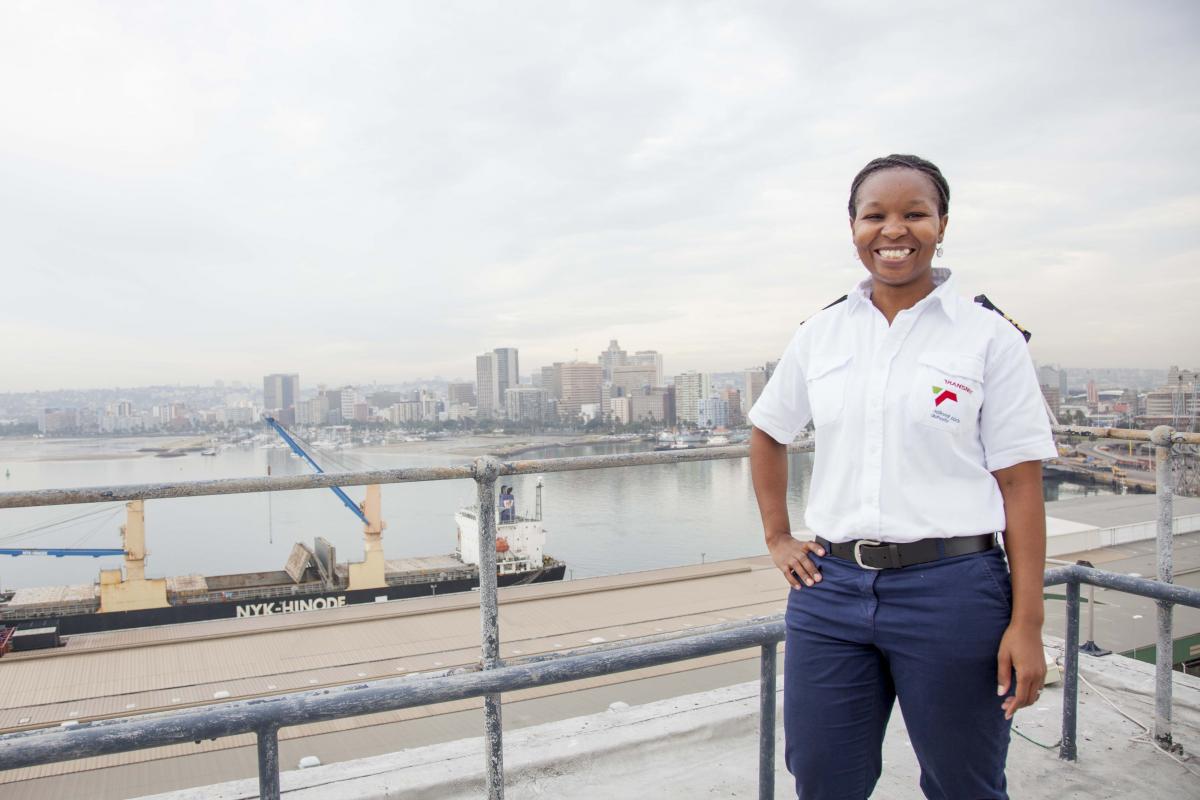 Speaking to Vuk’uzenzele Zungu said she was excited by her new position and slightly overwhelmed. “I know how enormous the task at hand is. It is not an easy one, but it is a challenge I am looking forward to.”
Speaking to Vuk’uzenzele Zungu said she was excited by her new position and slightly overwhelmed. “I know how enormous the task at hand is. It is not an easy one, but it is a challenge I am looking forward to.”
A harbour master has to ensure the safety of navigation, security of the harbour and correct operation of port facilities. She also has to liaise closely with the dredging department, do incident management, ensure vessels carrying dangerous goods comply with control measures, and ensure the port’s safety.
Zungu wanted to be an airline pilot, but her parents could not afford the training so she signed up for Maritime Studies at Durban University of Technology before joining the TNPA as a development candidate in 2001.
She spent her first eight months as a cadet and the only female crew member on a bulk carrier crewed by 28 Russian men. Only the captain could speak a little English. “I had to be physically and mentally strong to perform the role,” she said.
Marine pilot
She was one of the first three women in Africa to obtain a marine pilot open licence in 2011 which allows one to pilot any type of vessel.
A week later she piloted the MSC Chicago, then the largest container vessel to visit South Africa. This was soon after the entrance channel had been widened to make way for a new generation of container ships. She has seven years’ experience in guiding various vessels into the Port of Durban.
Being a marine pilot is not easy. “You have to study the sounding charts daily and have an accurate mental picture of the seabed. You have to know what’s underneath you including port depths, as the equipment on the visiting ships doesn’t always work. When you bring in a vessel you take over from the captain and all the decision-making is up to you. You are on your own and it can be stressful.
“You have to be prepared for any emergency including engine failure and other factors beyond your control, such as a sudden change in the weather,” she said.
“I wanted to see the world. I have now been to most of Europe and West Africa. It is a really exciting job. I’m encouraging young women especially those in school to take their studies seriously. Do not be afraid to take Maths and Science because you will need [those subjects] to become a marine pilot,” she said.
For more information:
Tug Master
Benjamin Smit
Durban
(031) 361-6328
Benjamin.Smit@transnet.net
Elelwani Nemukula
Durban
(031) 361-6667
Elelwani.Nemukula@
transnet.net
eThekwini to train artisans
eThekwini to train artisans lebangYouth matters
Government is working to ensure that unemployed youth get the necessary skills to contribute to growing the economy.
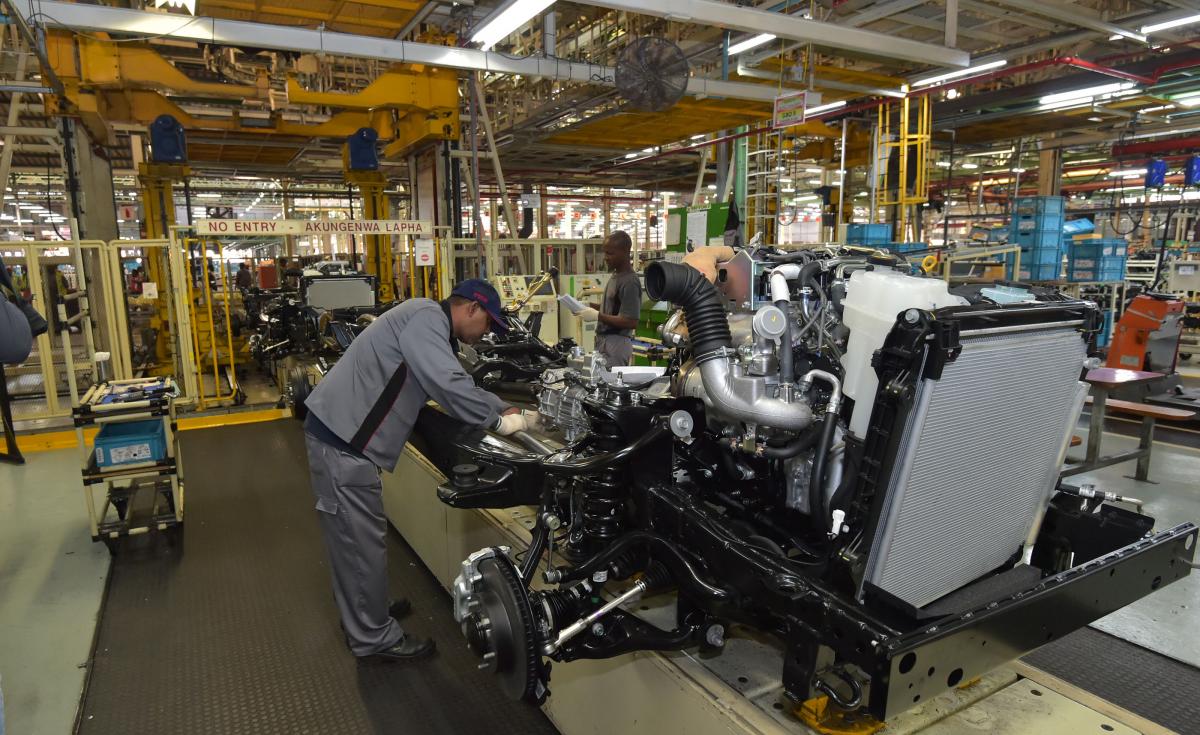 Unemployed young people living in eThekwini Municipality will soon benefit from the municipality’s R741.1 million Artisan Development Project. It aims to train youth, 60 percent of them women.
Unemployed young people living in eThekwini Municipality will soon benefit from the municipality’s R741.1 million Artisan Development Project. It aims to train youth, 60 percent of them women.
The funds will cover tuition costs, material, and monthly stipends while beneficiaries learn their special skills and project management.
eThekwini Municipality City Manager Sibusiso Sithole says applicants will be selected according to certain requirements which include being unemployed, younger than 36 and a resident of eThekwini.
“The municipality wants trainees who would be diligent and committed to their studies. The successful applicants will be trained in diesel and petrol mechanics, welding, fitting and turning and electrical maintenance.
“They will be enrolled at a trade testing centre to get a full artisan qualification. There are also options for lower skills programmes that have a lower entry requirement, such as bricklaying, plumbing, carpentry and painting. These trainees would also have a trade test,” says Sithole.
Once their studies are complete, one group will be trained further in entrepreneurship by the City’s Business Support Unit, and then helped to register their own co-operatives.
“The rest of the artisans would be made available for possible employment within the municipality, with the normal recruitment policy still applying,” said Sithole.
Sithole said the municipality was also in talks with the private sector to absorb qualified artisans into the job market.
Chief Executive of the Chamber of Commerce and Industry Dumile Cele welcomed the municipality’s decision to go ahead with the Artisan Development Project.
“We welcome it especially because there is a shortage of skills. The Durban Chamber would like to talk to the City about a possible partnership to make the initiative a reality,” she said.
Vuk’uzenzele spoke to Mfanafuthi Ndlovu (29), an unemployed youth who stands a chance to benefit from the training. Ndlovu completed an electricity course at eThekwini College in 2008.
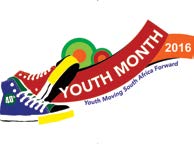 “I’m sitting at home with my certificate because there is no employment. I will not let the opportunity like this to pass me by. Once the application details become available I will make sure that I apply as I want to do a bricklaying course,” he said.
“I’m sitting at home with my certificate because there is no employment. I will not let the opportunity like this to pass me by. Once the application details become available I will make sure that I apply as I want to do a bricklaying course,” he said.
Another unemployed youth Nomvelo Dumakude (21) said she finished matric in 2014 but could not study at a tertiary institution because there was no money.
“God has answered my prayers. I will be one of the thousands who will benefit from the programme. I want to be an electrician,” she said.
“The municipality was also in talks with the private sector to absorb qualified artisans”.
This & That
Artisans Phase 1 training comprises approximately 12 to 15 weeks
For more information: www.durban.gov.za or call 031 311 1111
Support for farmers
Support for farmers lebang“Working with the provincial departments of agriculture, we have drilled 224 boreholes, 78 of which have been successfully completed.”
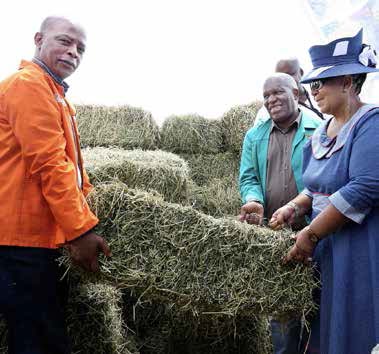 Agriculture, Fisheries and Forestry Minister Senzeni Zokwana says the department will continue to support farmers to cope with the effects of drought.
Agriculture, Fisheries and Forestry Minister Senzeni Zokwana says the department will continue to support farmers to cope with the effects of drought.
The Minister said this when he tabled the department’s Budget Vote in Parliament
recently.
He said the department allocated R381 million towards drought relief following the reprioritisation of the Comprehensive Agricultural Support Programme and Ilima/Letsema funds.
“Our focus is on the provision of animal feed, drilling and equipping of boreholes for smallholder and subsistence farmers.
“Working with the provincial departments of agriculture, we have drilled 224 boreholes, 78 of which have been successfully completed,” the Minister added.
About 320 000 bags of animal feed were bought and distributed to the affected farmers.
He said the Land Bank has also made available an amount of R400 million for concessional loans to drought-affected commercial farmers.
Minister Zokwana added that through the Agricultural Research Council (ARC), the department has introduced a drought-tolerant maize seed.
“In the financial year 2014/15, the ARC distributed 10 000 seed packs to smallholder farmers in various provinces.
“Results indicated that farmers who received and planted the maize cultivar experienced on average 50 percent increased yields when compared to conventional varieties available on the market. We now need to ensure that seed is available for farmers,” he said.
Agri-sector creates thousands of jobs
Agri-sector creates thousands of jobs lebangThe Agriculture, Fisheries and Forestry sector has created thousands of jobs over the past financial year, despite the tough economic climate.
This is according to Minister Senzeni Zokwana who said that during the third quarter of 2015, the number of smallholders increased by 743 and agro-processing sales grew by 8.4 percent.
Jobs in the sector increased by 211 000 in the third quarter of 2015 as compared to the same period in 2014.
“As part of our resolve to bring under-utilised lands into production, in the 2014/15 financial year, 136 253 hectares of land were put under production of maize, wheat, beans, vegetables and fruit, among others, through the Comprehensive Agricultural Support Programme (CASP) and Ilima/Letsema,” he said.
In the year ahead, the department aims to plant on 150 000 hectares of land through the CASP and Ilima/Letsema. He said R880 million will be set aside for this purpose.
Minister Zokwana said that in all three sectors – agriculture, forestry and fisheries – the value of exports has increased and South Africa maintains a positive trade balance.
“The value of agriculture, forestry and fisheries exports increased from R135 billion in 2014 to R144 billion in 2015.
“In the same period, our exports into other African countries increased from R59 billion to R62 billion and into Asia from R34.5 billion to R37.1 billion.
“The department will continue to focus on increasing intra-African trade and other global trade opportunities,” he said.
Industrial transformation
Industrial transformation lebangAn increased focus on local procurement and funding for prospective black industrialists is helping the Department of Trade and Industry transform the industrial sector.
“About 50 applications have already been received and are being considered by the department, covering sectors such as agro-processing, chemicals, cosmetics, pharmaceuticals, mineral beneficiating sectors, oil and gas, automotive, rail, clothing and textiles, green energy, capital equipment, and information and communications technology,” said Minister Rob Davies when tabling his department’s Budget Vote in Parliament recently.
“We are grateful for the many messages of support we are receiving from the private sector and – increasingly – firm offers to collaborate and partner with government to make the Black Industrialist Programme a success,” he said.
The Minister said the need to radically transform the economy makes government’s Black Industrialist Programme a very important initiative.
“We are harnessing the resources – both on the supply and the demand-side – across government and its agencies to support black industrialists who have the potential to grow, invest and create jobs.”
In the coming year, the department will focus on supporting qualifying black industrialists through access to funding, incentives, soft loans, market access, procurement opportunities, training and capacity building, matchmaking and information sharing, research and innovation, assistance to meet quality standards, productivity enhancement support, and economic infrastructure.
He said the support will be provided through collaboration with Developmental Finance Institutions, state-owned companies, the Council for Scientific and Industrial Research (CSIR), the South African Bureau of Standards (SABS) and other private and public institutions.
“The days when we had to walk into the forest in search for firewood are a thing of the past”
Meanwhile, the Minister said government’s Industrial Policy Action Plan has led to many industries consuming local goods and boosting several industries.
The department has identified more than 16 sectors or products, ranging from rail rolling stock, work wear and uniforms, and furniture, to benefit from mandatory local procurement.
“I have visited many of these factories in the past year and can report that these government contracts have created a mood of optimism on the shopfloors and factories.
“Industries that appeared to have no future and where assets were being run-down prior to being sold for scrap have been revitalised and long-term investments – including in machinery, people and skills – are being made, which augur well for these industries’ future,” he said, adding that interventions are supported by the department’s Clothing and Textile Competitiveness Improvement Programme.
He said after setting a 100 percent local content requirement in clothing, textiles, leather and footwear, the department has seen the re-introduction of products where local production had been discontinued.
“These include technical fabrics, protective footwear, protective fabrics and chambray fabrics.
“The value of public procurement of locally produced clothing and textile products recorded by National Treasury increased from R264 million in 2013/14 to R479 million in 2015/16 – an increase of 82 percent.”
Farewell Deputy Chief Justice Moseneke
Farewell Deputy Chief Justice Moseneke lebangDeputy Chief Justice of the Constitutional Court Dikgang Moseneke has retired from the bench after almost 40 years in the legal 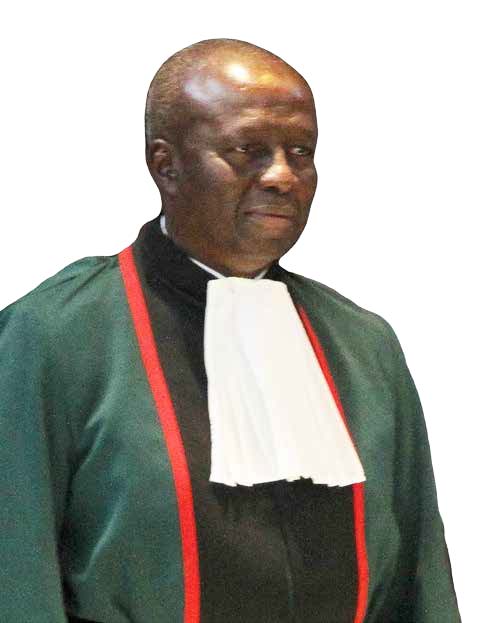 profession.
profession.
“What a privilege it was to serve you all and I am thankful for that. I had the space to work, to think, and to write to my heart’s content. I have had the pleasure of writing on virtually every big political, social and commercial disputes in our land.
“I have had the joy of going to law schools in this land and in other lands only to find extensive passages of what I have written taught to young lawyers at law schools. I have been blessed with remarkable colleagues who made judicial collegiality appear natural and inbred,” said the out-going Deputy Chief Justice during a special farewell session hosted by the Constitutional Court.
President Jacob Zuma wished the Deputy Chief Justice well on his retirement and thanked him for his service to the judiciary and country.
“Deputy Chief Justice Moseneke rose from almost impossible circumstances as the youngest prisoner on Robben Island through to becoming Deputy President of the Pan-Africanist Congress, an astute businessman and pioneer of Black Economic Empowerment to being one of the country’s finest jurists and esteem Justice of our Constitutional Court,” said President Zuma.
Chief Justice Mogoeng Mogoeng described his colleague as “a lawyer with exceptional abilities and a jurist that contributed enormously” to South Africa.
Mogoeng said he found it difficult to speak about someone as distinguished as Moseneke.
“There are profound lessons that we can learn. He has always been humble. He has told me, through tough times, that it is an honour just to be a judge.” Deputy Minister of Justice and Constitutional Development John Jeffery said Deputy Chief Justice Moseneke was one of the most respected and astute legal minds in the history of our country.
“Our courts have over the past two decades held government accounta-ble to ensure, in particular, the socio-economic rights of the poor and vul-nerable,” said Deputy Minister Jeffery.
He added that the Deputy Chief Justice was known as a highly principled, fearless and outspoken jurist – a man who is not afraid to speak truth to power.
The rise to the top
Deputy Chief Justice Moseneke was born in Pretoria in December 1947. He attended primary and secondary school there. But at the age of 15, when in standard eight, Moseneke was arrested, detained, and convicted of participating in anti-apartheid activities.
He was sentenced to 10 years imprisonment in Robben Island.
“The pain and adversity in my childhood prepared me for a life-long commitment to conduct that will bring true and full liberation of our land and all its remarkable people. The sojourn on Robben Island set me on a course of constantly asking: what are the features of a good society?”
“So I knew when I came out of Robben Island that I had to make a choice either to go into exile or to remain a combatant in the domestic struggle. I chose to do things the way I know best. To become a lawyer of remarka-ble excellence, of unfailing integrity and of commitment to the broader struggle of our people in all their kinds, shapes and colours for an equal and just society,” he added.
While jailed in Robben Island Deputy Chief Justice Moseneke obtained a BA degree in English and Political Science and a B luris degree. He later completed an LLB, all three degrees were conferred by the University of South Africa.
Before his appointment as Justice of the Constitutional Court, in November 2001, Moseneke was appointed a Judge of the High Court in Pretoria. In November 2002 he was appointed as judge in the Constitutional Court and in June 2005, Moseneke was appointed Deputy Chief Justice of the Republic of South Africa.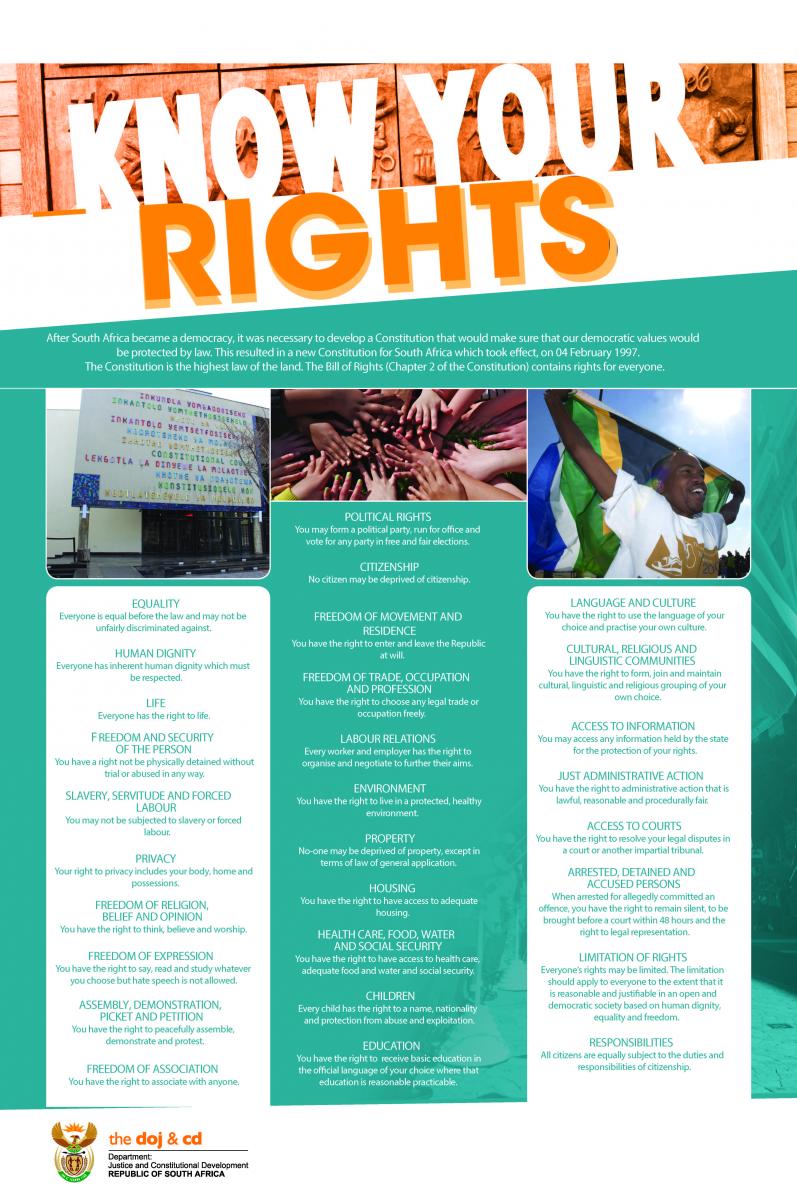
Award spurs teacher’s motivation
Award spurs teacher’s motivation JoyHigh school science teacher Siphiwe Sibanyoni (27) was one of the educators honoured at the 2016 National Teaching Awards.
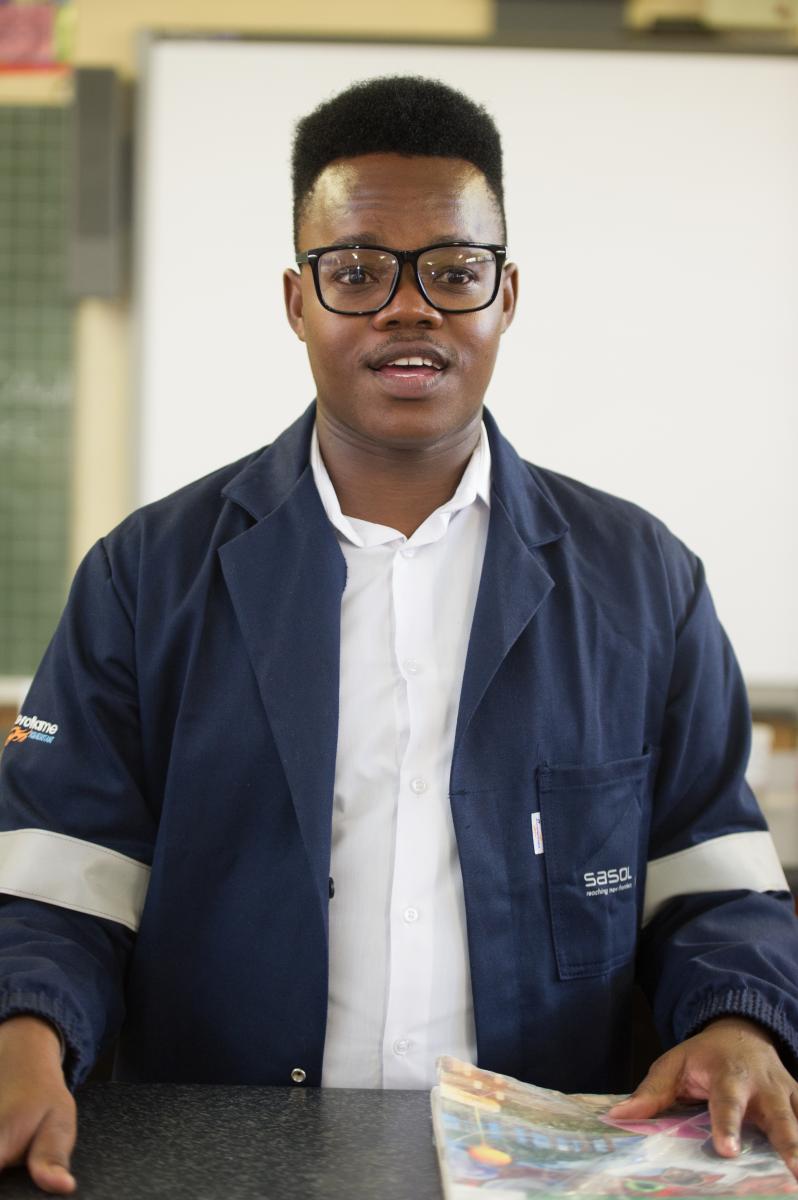 In recognition of Sibanyoni’s efforts to awaken a passion for science among his students he was named the winner of the Excellence in Natural Science Teaching Category during the awards, which is hosted annually by the Department of Education.
In recognition of Sibanyoni’s efforts to awaken a passion for science among his students he was named the winner of the Excellence in Natural Science Teaching Category during the awards, which is hosted annually by the Department of Education.
Sibanyoni, who teaches at Iketsetseng Senior Secondary School in Sasolburg, said hard work and determination helped earn him the award. “I am very happy to have won. It has motivated me to continue working even harder to ensure my learners enjoy science and do very well at it.”
The National Teaching Awards honour outstanding teaching in the following categories: Excellence in Primary School Teaching; Excellence in Secondary School Teaching; Excellence in Primary School Leadership; Excellence in Secondary School Leadership; Excellence in Grade R Teaching; Excellence in Special Needs Teaching; Excellence in ICT - Enhanced Teaching; and Lifetime Achievement.
Speaking during the ceremony Minister of Basic Education Angie Motshekga said: “We acknowledge their extraordinary efforts, which have been achieved often under very difficult conditions and in service to our children, many of whom come from underprivileged families and economically depressed communities.”
Shoe cleaning business shines
Shoe cleaning business shines JoySakhile Mbatha (24) and his brother Manqoba Mthembu (28) have taken charge of their lives and have found a way to be self-sustaining and create employment in their community.
The brothers are owners of Sizanayo Takkie Laundry, based in Spruitview on the East of Johannesburg, an innovative business that cleans people’s dirty shoes.
What started as a part-time business over the weekends has grown into a sustainable business.
“When we started the business, we were really just working from hand-to-mouth and at no point did we think it would turn out to be this big.
“We just saw a gap in the market where people were lazy to wash their sneakers and started wearing dirty shoes as a trend.
“We decided to take advantage of this and offered our services and washed people’s sneakers on weekends.”
In 2007 Manqoba quit his job to work in the business full-time.
“Although we failed to obtain funding because people didn’t see the business growing on a bigger scale, we didn’t allow that to discourage us and we decided to start off small,” said Mbatha.
So far the business employs seven people from their community on a part-time basis. The employees are gaining some work experience and are able to provide for their families.
The business is run from a rented garage in Spruitview and attracts clients from different parts of Johannesburg and Pretoria.
On average, the business takes in about 68 pairs of different kinds of shoes per week and the cost of the service depends on the material of the shoe. The monthly and annual income of the business continues to grow steadily each year.
“We have big plans for our business and we plan on turning it into a franchise. We would also like to join hands with gym companies and offer our service to their members,” said Mbatha.
Teacher invested in Science
Teacher invested in Science JoyHigh school science teacher Siphiwe Sibanyoni (27) could have chosen a career in the private sector but decided to share his passion for science with high school students.
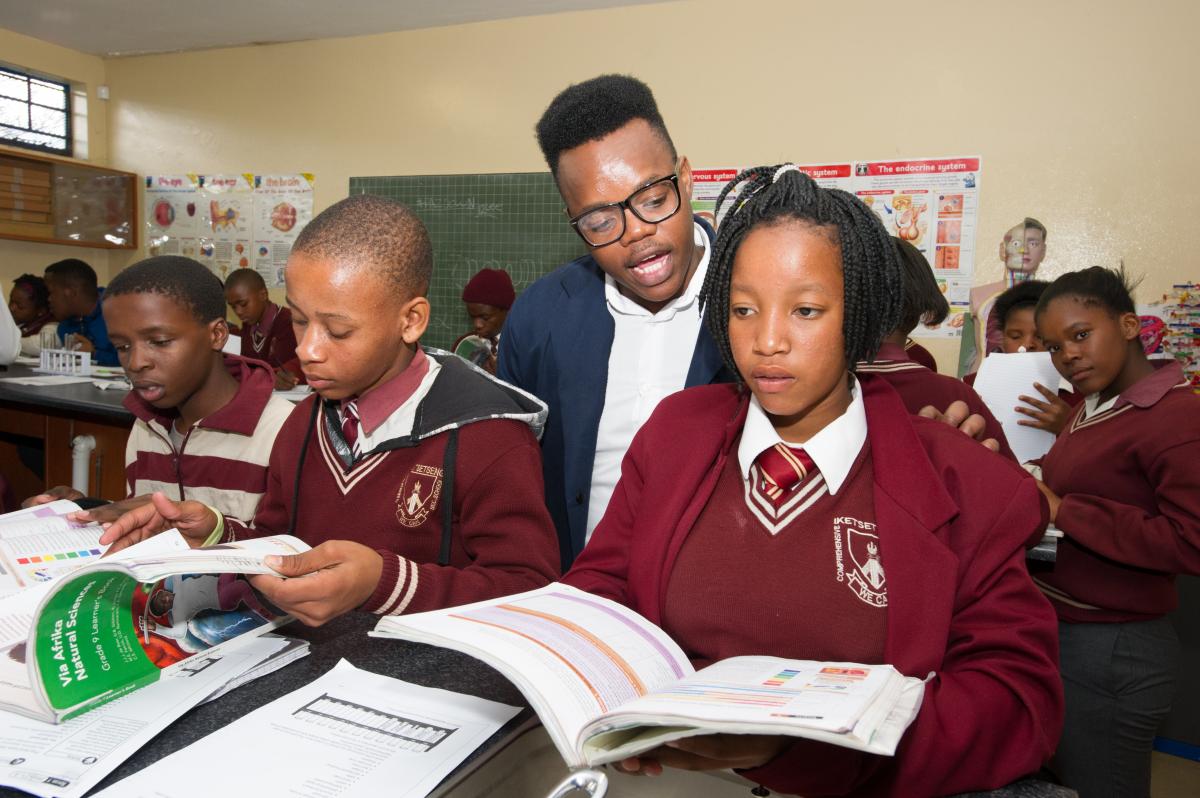 “I did not go into the private sector because I want to see more leaders in the science industry through my students. We need more science experts in this country, which is one of the reasons I decided to be a teacher.”
“I did not go into the private sector because I want to see more leaders in the science industry through my students. We need more science experts in this country, which is one of the reasons I decided to be a teacher.”
After obtaining a Bachelor of Science degree, Sibanyoni worked at the former Gauteng Department of Agriculture, Conservation and Environment as an intern microbiologist. He specialised in animal reproduction and biotechnology.
Later he participated in the TEACH South Africa programme. It recruits and selects top-performing young mathematics, science and English graduates from universities and places them in disadvantaged and rural schools for at least two years to become educators.
Sibanyoni was placed at Nkgopoleng Secondary School in Sasolburg from 2012 until September 2015 and then appointed head of Iketsetseng Senior Secondary School’s science department.
He loves sharing his love of science. When he realised some of his Grade 9 to 12 learners were struggling to grasp what was being taught in the classroom, he explored other
avenues.
“I started afterschool classes for learners to help improve their grades. I also participate in winter classes for Grade 9 to 2 learners and use the Internet Broadcast Project as part of teaching science.”
Learners get to watch videos and observe real simulations of scientific concepts. “I also take my learners on educational tours and encourage them to take part in science olympiads.”
Apart from his science degree, Sibanyoni has a postgraduate certificate in Education specialising in Further Education and Training Science education. He is studying for an Honours degree in Education (Natural and Physical Science).
Improving mathematics and science results
According to Sibanyoni, for mathematics and science marks in South Africa to improve, learners have to enjoy the sciences.
“We need to show learners that science is not a subject that you learn because you have to, but that science is around them every day; in this way they will love the subject.
“Also, teachers should ensure that effective teaching and learning take place. We as teachers need to ensure that we engage learners during mathematics and science lessons.”
Sibanyoni advises educators to be lifelong learners and continuously update their knowledge and skills.
“My plans for the future include opening a science resource centre where I can continuously interact with learners on science activities at a higher level. I also see myself being a leader in the teaching of Science in the country,” he said.
From bank teller to business owner
From bank teller to business owner JoyPeggy Ndlovu (50), a former bank teller, always dreamed of owning her own business so when BP opened opportunities for franchisees in 2009, she resigned from her job to start her own BP petrol station in Umlazi, KwaZulu-Natal.
Ndlovu told Vuk’uzenzele her venture would not have been possible without a business loan of R4 million from Ithala Finance Development Incorporation Limited. Ithala funds small and medium industrial and commercial businesses and agricultural enterprises, tourism ventures, cooperatives and building contractors.
Ndlovu struck out on her own after 19 years as a bank teller. “I took my retirement package and put it into my business as Ithala wanted my own contribution for them to approve my business loan. On top of this, I had to give them my house as security. I had no choice but to make it work,” she said.
Ndlovu started with 10 employees but now, as a 24-hour petrol station, the business employs 35, people, 24 petrol attendants and 11 people working as cashiers or in admin.
One of the managers at the petrol station, Thembinkosi Ndlovu, said Ndlovu taught him labour laws and other business skills. Colleague Maso Ndeza (32) said he enjoys his job. “I don’t have any plans to move from this business now, but a future plan is to open my own business, using the experience I have gained here.”
Ndlovu’s advice for aspiring entrepreneurs is simple. “Don’t be afraid to take bigger risks. The bigger the risk, the higher the return. Do not rush to start a business, take your time and do research so you can have a good business plan. Never give up when you are facing challenges,” she said.
WC residents get homes
WC residents get homes JoyWhen Human Settlements Minister Lindiwe Sisulu went to the Western Cape to hand over the Belhar Gardens Rental Estate, one of the new residents told how her new bachelor flat had changed her life.
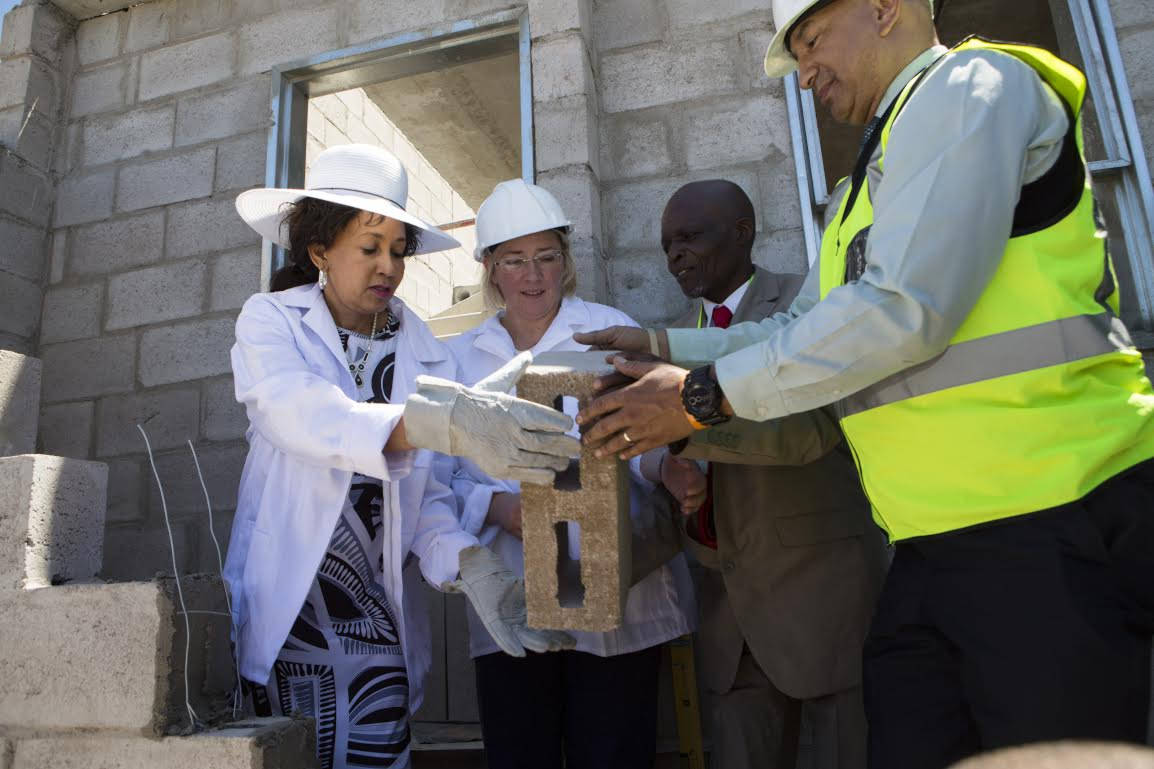 With her low wages, Nombulelo Tsitsa could not afford a bond and has been on a waiting list for social housing for a long time.
With her low wages, Nombulelo Tsitsa could not afford a bond and has been on a waiting list for social housing for a long time.
This “bad situation” left Tsitsa with no option but to rent shacks and backrooms for short periods in and around Lower Cross Roads in the Philippi township in the Western Cape.
Minister Sisulu handed over the first phase of the social housing project to Tsitsa and several other beneficiaries.
“This is the future of Human Settlements where people actually take ownership of their property and pay for it, and we as government provide the necessary assistance for them to take responsibility,” said Minister Sisulu who was accompanied by Western Cape Human Settlements MEC Bonginkosi Madikizela and local councillors.
The rental fee is R800 per month and for Tsitsa and others the new home has improved her quality of life.
“I now take a bath in an actual bath or shower with hot water,” she said
Belhar Gardens will yield 629 rental units upon completion, with 192 allocated to primary beneficiaries earning less than R3 500 per month, and 437 units allocated to the secondary beneficiaries earning from R7 500 per month.
Construction at the R200 million estate started in January last year and phase one of the project was completed in March this year, with residents moving in last month.
Rental at the estate starts from R720 for a bachelor flat, and the estate has 24 hour security and residential access is through a biometric fingerprints system.
The Minister said while government has a housing backlog that needs to be reduced, 4.3 million houses and subsidies have already been provided. Government is targeting to have handed over six million housing opportunities by the end of 2019.
“We are saying to all the people out there who are still without shelter to have hope. If this [Belhar Estate] is possible, your turn will come too,” she said.
Know your Minister
Know your Minister JoyMinister Naledi Pandor
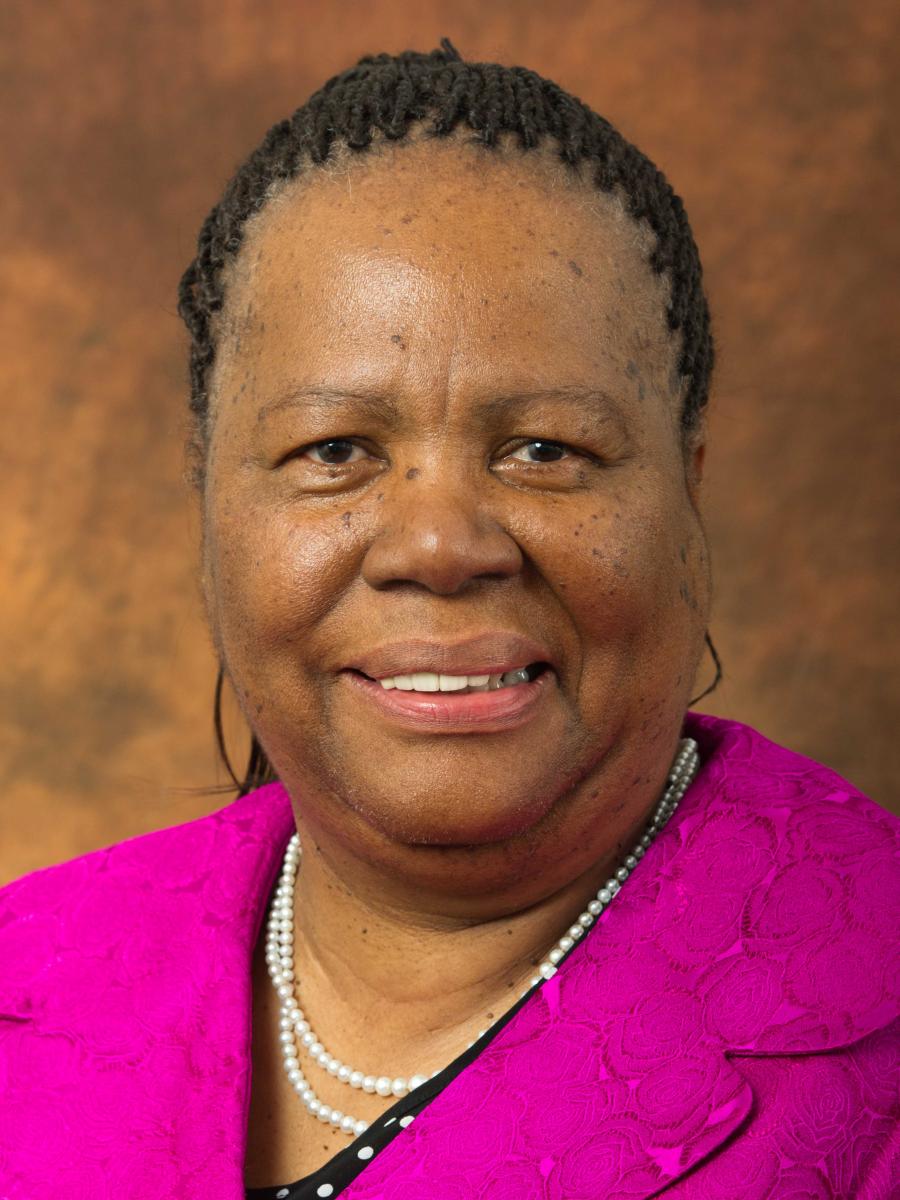 Naledi Grace Pandor is the Minister of Science and Technology. She leads a department that is responsible for creating an enabling environment, resources for science, technology and innovation in support of South Africa’s development.
Naledi Grace Pandor is the Minister of Science and Technology. She leads a department that is responsible for creating an enabling environment, resources for science, technology and innovation in support of South Africa’s development.
About the Minister
Minister Pandor holds a Bachelor of Arts from the University of Botswana and Swaziland and a Master in Arts in Education from the University of London.
In 1992 she studied for a Diploma in Higher Education, Administration and Leadership at Bryn Mawr in the United States of America.
In 1997, while serving as a Member of Parliament (MP), she received a Master of Arts in Linguistics from Stellenbosch University, and a Diploma in Leadership in Development from the Kennedy School of Government at Harvard.
She is an experienced Minister having been in a ministerial position for over a decade and joining Parliament as an MP in 1994.
She was a Deputy Chairperson of the National Council of Provinces (NCOP) in 1998, and Chairperson of the NCOP from 1999 to 2004.
Minister Pandor was appointed as a Minister of Education between 2004 to 2009.
From May 2009 to October 2012 she served as Minister of Science and Technology. She was appointed as the Minister of Home Affairs again from 4 October 2012 to 25 May 2014.
About the Department
The Department of Science and Technology is responsible for coordination, integration as well as better management of all government-funded science and technology.
The department also provides a holistic overview of public expenditure on science and technology.
Jobs: Justice & Constitutional Development Jun 2016 - 1
Jobs: Justice & Constitutional Development Jun 2016 - 1 JoyFamily Advocate LP 7
Reference: 117/16/FA/WC
Package: R637 860 – R687 150 per annum. Salary will be in accordance with OSD determination. The successful candidate will be required to sign a performance agreement.
Requirements: An LLB Degree or a recognized four (4) year legal qualification; At least 5 years’ appropriate post qualification/litigation experience; Admitted as an Advocate; The right of appearance in the High Court of South Africa; A valid driver’s licence.
Enquiries: Advocate G Parker (021) 426 1216
Court Manager (3 Posts)
Reference: 89/16EC / Centre: Magistrate Court: Centane
Reference: 90/16EC / Centre: Magistrate Court: Mdantsane
Reference: 115/16/WC / Centre: Magistrate Office, Mosselbay
Salary: R361 659 – R426 009 per annum. The successful candidate will be required to sign a performance agreement.
Requirements: A three year qualification in Administration (NQF level 6) and/or a National Diploma Service Management (NQF level 5) plus the module on Case Flow Management or equivalent qualification; At least 3 years’ managerial or supervisory experience; A valid drivers’ licence; Knowledge and experience in office and district administration; Knowledge of the financial management and PFMA; Experience in managing Trust (Third Party Funds) and Vote Account; Experience in the Court environment will be an added advantage.
Enquiries: Eastern Cape: Mrs. L Pretorius (043) 702 7000; Cape Town: Mr. M Cerfonteyn (044) 802 5800
Social Work Supervisor (Family Counsellor Supervisor) (2 Posts)
Reference: 111/16EC;
Centre: Family Advocate: Port Elizabeth (Post To Be Seconded To Graaff-Reinet) (1) And Family Advocate: Mthatha (1)
Salary: R 318 102 – R368 766 per annum. Salary will be in accordance with the OSD determination. The successful candidate will be required to sign a performance agreement.
Requirements: Bachelor’s Degree in Social Work or equivalent qualification which allows for professional registration with the SACSSP; Professional registration with the SACSSP as a Social Worker; A minimum of 7 years appropriate experience in social work after registration as Social Worker with the SACSSP; Knowledge and experience in Mediation and the principles and practices of Social work profession; Court experience in Evidence; knowledge and application of Family Law, including Mediation in certain Divorce Matters Act, Maintenance Act and Domestic Violence Act, children’s Act ( inclusive of Hague Convention on international child abduction); A valid driver’s licence; Social work supervisory experience will be an added advantage; Proficiency in Xhosa can be an added advantage
Enquiries: Mrs. M De Lange (041) 508 1300
Legal Researcher
Reference: 16/133/SLA
Salary: R311 784 – R367 254 per annum. The successful candidate will be required to sign a performance agreement.
Requirements: LLB or appropriate 4 years recognized legal qualification; Experience as a legal researcher will serve as a strong recommendation; Knowledge and experience in the field of Constitutional Law, Administrative Law and Internal Law.
Enquiries: Ms. P Leshilo (012) 357 8240
Assistant Director: Enterprise Risk Management, (03 Posts)
Reference: 16/136/Coo
Salary: R311 784 – R367 254 per annum. The successful candidate will be required to sign a performance agreement.
Requirements: National Diploma in Accounting, Auditing, Cost Management, Risk Management or equivalent qualification; 3 years relevant experience in Risk Management including Auditing; Knowledge of Risk Management software: BarnOwl will be an added advantage; A valid driver’s licence.
Enquiries: Ms. Onthatile. Melato (012) 315 1351
Social Worker/ Family Counsellor (Grade 1)(3 Posts)
Reference: 118/16/Fa/Wc
Salary: R211 263 – R 244 908 per annum. Salary will be in accordance with OSD determination. The successful candidate will be required to sign a performance agreement
Requirements: Bachelor Degree in Social Work or equivalent qualification; Appropriate experience in Social Work after registration as Social Worker with the SACSSP; Registration with SA Council for Social Service Professions (SACSSP); Knowledge and experience in Mediation; Experience in Forensic Social Work or Court Work will be an added advantage; Knowledge and application of Family Law, including Mediation in certain Divorce Matters Act; Maintenance Act and Domestic Violence Act (inclusive of Hague Convention on International Child Abduction); A valid drivers’ licence.
Enquiries: Advocate G Parker at Tel: (021) 426 1216
Closing date is 20 June 2016
NOTE: Interested applicants may visit the following website: www.justice.gov.za or www.dpsa.gov.za to view the full job specification of the above positions. Applications must be submitted on Form Z83, obtainable from any Public Service Department or on the internet at www.gov.za. A Z83 form & CV must be accompanied by original certified copies of qualifications and identity document and a driver’s licence where necessary. A SAQA evaluation report must accompany foreign qualifications. Applications that do not comply with the above mentioned requirements will not be considered. All shortlisted candidates for SMS posts will be subjected to a technical exercise that intends to test relevant technical elements of the job, the logistics of which will be communicated. Following the interview and technical exercise, the selection panel will recommend candidates to attend a generic managerial competency assessment (in compliance with the DPSA Directive on the implementation of competency based assessments). Candidate will complete a financial disclosure form and also be required to undergo a security clearance. If the candidate is applying for an OSD post, certificates of service must be attached to the CV.
The DOJ&CD is an equal opportunity employer. In the filling of vacant posts the objectives of section 195 (1) (i) of the Constitution of South Africa, 1996 (Act No: 108 of 1996), the Employment Equity imperatives as defined by the Employment Equity Act, 1998 (Act No: 55 of 1998) and relevant Human Resources policies of the Department will be taken into consideration. Reasonable accommodation shall be applied for People with Disabilities including where drivers licence is a requirement. Shortlisted candidates will be subjected to a personnel vetting process. Correspondence will be limited to short-listed candidates only. If you do not hear from us within 3 months of this advertisement, please accept that your application has been unsuccessful. The department reserves the right not to fill these positions.
Women and people with disabilities are encouraged to apply and preference will be given to the EE Target.
Tel: 012 315 1111 Private Bag X81, Pretoria, 0001 Momentum Centre, 329 Pretorius Street, Pretoria, www.justice.gov.za @dojcd_ZA at DOJ CD
Jobs: Justice and Constitutional Development Jun 2016 - 2
Jobs: Justice and Constitutional Development Jun 2016 - 2 JoyState Law Adviser LP7 - LP8
Reference: 16/154/SLA
Package: R637 860 – R1 058 196 per annum. (Salary will be in accordance with OSD determination). The successful candidate will be required to sign a performance agreement.
Requirements: LLB or 4 year recognized legal qualification; At least 5 years appropriate post qualification litigation/advisory experience; Admission as an Advocate or Attorney; Knowledge in Constitutional Law, Administrative Law and International Law; Experience as a researcher in legal environment.
Enquiries: Ms P Leshilo (012) 357 8240
Deputy Director: Language Policy, Planning and Development
Reference: 16/149/CS
Package: R612 822 – R721 878 per annum (All inclusive). The successful candidate will be required to sign a performance agreement.
Requirements: An appropriate 3 years Degree/ National Diploma or equivalent majored in languages or linguistics; 3 years relevant junior or middle management experience
Enquiries: Mr. T. Rangwato (012) 315 1456
Deputy Director: Process Analyst
(Contract Appointment Ending 30 September 2018)
Reference: 16/151/ISM
Package: R612 822– R721 878 per annum (All inclusive). The successful candidate will be required to sign a performance agreement.
Requirements: A National Diploma/Degree in Information Systems/ Technology/Computer Science/Industrial Engineering or equivalent qualification at NQF Level 6; A minimum of 3 years’ experience in a process analyst or business analyst role; Knowledge / experience in applying formal business process modeling, process re-engineering methods; Experience in the implementation of ICT solutions in a solution design capacity; Demonstrate experience in application of business analysis methodologies, techniques and tools within problem solving and design; Knowledge in working with business process management tools/repositories will be an added advantage.
Enquiries: Ms. E Zeekoei (012) 315 1436
Assistant Director: Language Policy Planning and Development
Reference: 16/148/CS
Package: R311 784 – R367 254 per annum. The successful candidate will be required to sign a performance agreement.
Requirements: An appropriate 3 years Degree/ National Diploma or equivalent majored in languages or linguistics; 3 years relevant experience.
Enquiries: Mr. T. Rangwato (012) 315 1456
Assistant Director: Terminology Development
Reference: 16/144/CS
Salary: R311 784 – R367 254 per annum. The successful candidate will be required to sign a performance agreement.
Requirements: An appropriate 3 years Degree/ National Diploma or equivalent majored in languages or linguistics; 3 years relevant experience.
Enquiries: Mr. T. Rangwato (012) 315 1456
Assistant Director: Translation and Editing
Reference: 16/146/CS
Salary: R311 784 – R367 254 per annum. The successful candidate will be required to sign a performance agreement.
Requirements: An appropriate 3 years Degree/ National Diploma or equivalent majored in languages or logistics; 3 years relevant experience.
Estate Controller EC1
Reference: 16/134/MAS
Salary: R162 726 per annum. (Salary will be in accordance with OSD determination). The successful candidate will be required to sign a performance agreement.
Requirements: An LLB degree or recognized four years legal qualification.
Enquiries: Mr. C. Msiza (012) 315 4754
Closing date is 27 June 2016
NOTE:
Interested applicants may visit the following website: www.justice.gov.za or www.dpsa.gov.za to view the full job specification of the above positions. Applications must be submitted on Form Z83, obtainable from any Public Service Department or on the internet at www.gov.za. A Z83 form & CV must be accompanied by original certified copies of qualifications and identity document and a driver’s licence where necessary. A SAQA evaluation report must accompany foreign qualifications. Applications that do not comply with the above mentioned requirements will not be considered.
All shortlisted candidates for SMS posts will be subjected to a technical exercise that intends to test relevant technical elements of the job, the logistics of which will be communicated. Following the interview and technical exercise, the selection panel will recommend candidates to attend a generic managerial competency assessment (in compliance with the DPSA Directive on the implementation of competency based assessments). Candidate will complete a financial disclosure form and also be required to undergo a security clearance.
If the candidate is applying for an OSD post, certificates of service must be attached to the CV. The DOJ&CD is an equal opportunity employer. In the filling of vacant posts the objectives of section 195 (1) (i) of the Constitution of South Africa, 1996 (Act No: 108 of 1996), the Employment Equity imperatives as defined by the Employment Equity Act, 1998 (Act No: 55 of 1998) and relevant Human Resources policies of the Department will be taken into consideration.
Reasonable accommodation shall be applied for People with Disabilities including where drivers licence is a requirement. Shortlisted candidates will be subjected to a personnel vetting process. Correspondence will be limited to short-listed candidates only. If you do not hear from us within 3 months of this advertisement, please accept that your application has been unsuccessful. The department reserves the right not to fill these positions. Women and people with disabilities are encouraged to apply and preference will be given to the EE Target.
Tel: 012 315 1111 Private Bag X81, Pretoria, 0001 Momentum Centre, 329 Pretorius Street, Pretoria, www.justice.gov.za @DOJCD_ZA at DOJCD
Jobs: Correctional Services Jun 2016
Jobs: Correctional Services Jun 2016 JoyAppointment under the Correctional Services Act
Area Coordinator Corrections
Free State & Northern Cape Region: AC Bizzah Mxakhate (DCS5/01)
Inclusive package: R 632 589.00 per annum
Centre Coordinator Corrections
Free State & Northern Cape Region: Bizzah Makhate Centre B (DCS5/02)
Salary: R 376 227.00 per annum
Head Satellite Community Corrections
Free State & Northern Cape Regionn: Goldfields Comcorr (DCS5/03)
Salary: R 376 227.00 per annum
Centre Coordinator Staff Support
Free State & Northern Cape Region: Tswelopele (DCS5/04)
Salary: R 376 227.00 per annum
Chairperson: Case Management Committee X 2
Free State & Northern Cape Region: Grootvlei Maximum (DCS5/05), Tswelopele (DCS5/06)
Salary: R 376 227.00 per annum
Unit manager X 4
Free State & Northern Cape Region: Goedemoed Med B (DCS5/07), Grootvlei Max (DCS5/08), Harrismith (DCS5/09), Upington (DCS5/10)
Salary: R 315 084.00 per annum
Head Correctional Centre X 2
Free State & Northern Cape Region: Bizzah Makhate Centre C (DCS5/11), Heilbron (DCS5/12)
Salary: R 315 084.00 per annum
Security Manager: Community Liaison
Free State & Northern Cape Region: Bloemfontein Comcorr (DCS5/13)
Salary: R 315 084.00 per annum
Centre Coordinator Corrections
Free State & Northern Cape Region: Grootvlei Med B (DCS5/14)
Salary: R 315 084.00 per annum
Division Head Security
Free State & Northern Cape Region: Groenpunt Med (DCS5/15)
Salary: R 315 084.00 per annum
Division Head Case/Centre Management Administration
Free State & Northern Cape Region: Tswelopele (DCS5/16)
Salary: R 315 084.00 per annum
Security Manager: Nutritional Services
Free State & Northern Cape Region: Grootvlei (DCS5/17)
Salary: R 315 084.00 per annum
Secretary Parole Board
Free State & Northern Cape Region: Groenpunt (DCS5/18)
Salary: R 253 740.00 per annum
Chairperson X 6: Correctional Supervision and Parole Board [Contract appointment effective until 31 March 2017]
Free State & Northern Cape Region: Bizzah Makhate (DCS5/19), Colesberg (DCS5/20), Grootvlei (DCS5/21), Groenpunt (DCS5/22), Goedemoed (DCS5/23), Kimberley (DCS5/24)
An all-inclusive remuneration package R 463 680.00 per annum.
Vice Chairperson X 3: Correctional Supervision and Parole Board [Contract appointment effective until 31 March 2017]
Free State & Northern Cape Region: Bizzah Makhate (DCS5/25), Colesberg (DCS5/26), Kimberley (DCS5/27)
An all-inclusive remuneration package: R 421 344.00 per annum
Additional Community Member X 8 Correctional Supervision and Parole Board [Contract appointment effective until 31 March 2017]
Free State & Northern Cape Region: Bizzah Makhate (DCS5/28), Colesberg X 2 (DCS5/29), Grootvlei X 2 (DCS5/30), Kimberley X 2(DCS5/31), Upington (DCS5/32)
Salary: an hourly tariff of R 190.00
Appointment under the Public Service Act
Chief Construction Project Manager
Free State & Northern Cape Region: Regional Office (DCS5/33) Inclusive package:
R 809 988.00 per annum
Construction Project Manager X 2
Free State & Northern Cape Region: Regional Office (DCS5/34)
Salary: R 552 489.00 per annum
Deputy Director Area Coordinator Corporate Services
Free State & Northern Cape Region: AC Upington (DCS5/35)
Inclusive package: R 612 822.00 per annum
Psychologist Grade 1
Free State & Northern Cape Region: Upington (DCS5/36)
Inclusive package: R590 589.00 per annum
Manager Legal Services MR5
Free State & Northern Cape Region: AC Kimberley (DCS5/37)
Salary: R 309 126.00-R 762 630.00 per annum
Assistant Director Technician Facilities
Free State & Northern Cape Region: RC Office (DCS5/38)
Salary: R311 784.00 per annum
Assistant Director Manager Recruitment
Free State & Northern Cape Region: RC Office (DCS5/39)
Salary: R 311 784.00 per annum
Assistant Director Inspectorate
Free State & Northern Cape Region: RC Office (DCS5/40)
Salary: R 311 784.00 per annum
Artisan Chief Maintenance
Free State & Northern Cape Region: Kimberley (DCS5/41)
Salary: R 319 971.00 per annum
Assistant Director Manager Information Technology
Free State & Northern Cape Region: AC Bizzah Makhate (DCS5/42)
Salary: R 311 784.00 per annum
Assistant Director Manager Supply Chain Management X 2
Free State & Northern Cape Region: AC Grootvlei (DCS5/43), AC Kimberley (DCS5/44)
Salary: R 311 784.00 per annum
Assistant Director Manager Logistics
Free State & Northern Cape Region: AC Grootvlei (DCS5/45)
Salary: R 311 784.00 per annum
Senior Admin Officer Supply Chain Management
Free State & Northern Cape Region: AC Colesberg (DCS5/46)
Salary: R 262 272.00 per annum
Senior Provisioning Admin Officer Procurement
Free State & Northern Cape Region: AC Goedemoed (DCS5/47)
Salary: R 262 272.00 per annum
Senior Admin Officer Clubs
Free State & Northern Cape Region: AC Goedemoed (DCS5/48)
Salary: R 262 272.00 per annum
Senior State Accountant: Management Accounting
Free State & Northern Cape Region: AC Kimberley (DCS5/49)
Salary: R 262 272.00 per annum
Senior State Accountant: Supervisor Financial Accounting
Free State & Northern Cape Region: AC Goedemoed (DCS5/50)
Salary: R 262 272.00 per annum
Senior Admin Officer: Leases: Facilities
Free State & Northern Cape Region: Regional Office (DCS5/51)
Salary: R262 272.00 per annum
Clinical Nurse Practitioner: PHC
Free State & Northern Cape Region: Victoria West (DCS5/52)
Salary: R 317 271.00 per annum
Professional Nurse: General Nursing: Grade 1 X3
Free State & Northern Cape Region: Grootvlei (DCS5/53) X 2 , Tswelopele (DCS5/54)
Salary: R 210 702.00 per annum
State Accountant: Voucher Control
Free State & Northern Cape Region: AC Bizzah Makhate (DCS5/55)
Salary: R 211 194.00 per annum
Admin Clerk: Health Care Services
Free State & Northern Cape Region: RC Office (DCS5/56)
Salary: R 142 461.00 per annum
Admin Clerk: Security Services
Free State & Northern Cape Region: RC Office (DCS5/57)
Salary: R 142 461.00 per annum
Recruitment Clerk
Free State & Northern Cape Region: RC Office (DCS5/58)
Salary: R 142 461.00 per annum
Clerk Personnel X 4
Free State & Northern Cape Region: Colesberg (DCS5/59), RC Office (DCS5/60)X 2, Upington (DCS5/61)
Salary: R 142 461.00 per annum
Switchboard Operator
Free State & Northern Cape Region: De Aar ((DCS5/62)
Salary: R 119 154.00 per annum
Closing date: 24 June 2016 @ 15H45
Note: Before you apply: All costs associated with an application will be borne by the applicant. The Department of Correctional Services is an equal opportunity employer. The Department will take into consideration the objectives of Section 195 (1) (i) of the Constitution of the Republic of South Africa, 1996 (Act 108 of 1996) and the Employment Equity Act, 1998 (Act 55 of 1998) in filling of these vacancies. It is our intention to promote representivity in respect of race, gender and disability through the filling of these positions. In support of this strategy, applicants need to indicate race, gender and disability status on the application form/CV. Applicants who have retired from the Public Service with a specific determination that they cannot be re-appointed or have been declared medically unfit will not be considered.
Please take note that correspondence will only be conducted with the shortlisted candidates. If you have not been contacted within three (3) months of the closing date of the advertisement, please accept that your application is unsuccessful.
Applicants must note that further checks will be conducted once they are shortlisted and that their appointment is subject to positive outcomes on these checks, which include security clearance, security vetting, qualification verification, and criminal records verification. Appointment to some of these posts will be provisional, pending the issue of a security clearance. If you cannot get a security clearance, your appointment will be re-considered/possibly terminated. Finger prints may be taken on the day of interviews.
The Department of Correctional Services reserves the right not to fill any of these advertised posts.
Applications: Applications must be submitted on form Z83 (Public Service Application form), obtainable from any Public Service Department, and must be completed in full. Applications must be accompanied by a CV, certified copies of qualifications and ID NOT older than 3 months. Where an advertisement states that a valid Driver’s Licence is required, then please submit a certified copy of your licence. Please send a separate and complete application for each post you apply for, stating the correct reference for each position you are interested in. Faxed and e-mailed applications will not be accepted — Candidates must comply with the minimum appointment requirements — CV’s should be aligned to reflect one’s degree of compliance with the above-mentioned requirements and responsibilities. Applications must reach DCS before the closing date and time. It is the sole responsibility of an applicant to ensure that their application reaches DCS before the stipulated closing date and time.
NB: Indicate the Management Area, Correctional Centre, Regional Office, reference number and position you are applying for on your application form (Z83) and post your complete application to the address as indicated below:
Free State/Northern Cape Region:
Postal Address: Head Recruitment, Private Bag X20530, Bloemfontein, 9300
Contact person: Mr. Monare KME and Ms. Mkuni NJ at 051 404 0270 or 051 4040283
Physical Address: 103 Zastron Street, Agrimed Building, Bloemfontein
Boxing is back
Boxing is back JoySport
The Department of Sport and Recreation has invested approximately R11 million into the roll-out of the Boxing is Back programme
This follows an open tender process to get the services of credible and capable boxing promoters - registered and licensed by Boxing South Africa (BSA) – to deliver television-ready tournaments.
Minister of Sport and Recreation Fikile Mbalula said the return of boxing to live television is the result of a partnership between the department and the South African Broadcasting Corporation (SABC).
“We can proudly announce that, indeed, boxing has returned to TV. Live boxing matches across the provinces of our country have been featured on SABC as our media partner in promoting the sport of boxing. We are even more proud that over seven of our nine provinces have been reached.”
 The Boxing is Back initiative aims to revitalise and grow boxing. The roll-out started with the first edition of the matches in the North West last month when the City of Matlosana hosted eight matches at the James Motlatsi Stadium.
The Boxing is Back initiative aims to revitalise and grow boxing. The roll-out started with the first edition of the matches in the North West last month when the City of Matlosana hosted eight matches at the James Motlatsi Stadium.
“Working jointly with our provincial counterparts in the Department of Education and Sports Development we are affording the people of the province an opportunity to satisfy their hunger for this sport,” said Minister Mbalula at the launch of the programme.
The department’s decision to bring back the sport to television was welcomed by those in the boxing fraternity.
Former world champion and current trainer Jan Bergman said the decision to bring back the sport to television will help boxers.
“I think this was a good move because it will help boxers deal with financial stress. I believe that things will now be done correctly under Boxing South Africa.”
Meanwhile, Minister Mbalula also announced the appointment of Tsholofelo Lejaka as the new Chief Executive Officer of BSA.
“The new CEO is the real deal and I believe he will do things according to the book,” said Minister Mbalula.
He added that the support given to BSA is already bearing fruits.
“We have provided capacity and also seconded staff to the entity… We further extended our internal audit services to the entity and in this regard we have seen that the audit outcomes of BSA have stabilised and are on an upward trajectory.”
Fast facts
Gerrie Coetzee was one of the fastest heavyweight boxers South Africa ever produced. Coetzee first won the national lightweight title as a 13-year-old amateur when he punished 16-year-old Hennie Colyn. (Source: SouthAfrica.info)
Young blade runner aims high
Young blade runner aims high JoySport
The power of the mind and the will to overcome life’s challenges have contributed to 14-year-old Ntando Mahlangu’s successful career as an athlete.
Young athlete Ntando Mahlangu chose to rise above his circumstances and is today building a successful career in athletics.
Mahlangu was born with hemimelia, a condition in which the lower legs do not fully develop, and had to have both his legs amputated at the knees.
Months later, he was introduced to Jumping Kids, an organisation that provides prosthetic solutions and plays a role in creating awareness and advocating for change.
The organisation arranged for the fitment of his first prosthetic legs, including a pair of blades through a joint project with Avis.
In an interview with Vuk’uzenzele, Mahlangu explains that although he was initially scared when he got his legs four years ago, he knew he would be able to use them one day.
Today, running is his favourite sport because it makes him feel free.
He recently participated in the national championships against able-bodied athletes where he won a bronze medal in the 400m under 16 category. He also boasts four gold medals from the 2016 Nedbank National Championships for Physically Disabled.
“Getting legs changed everything. I can do whatever I want and can help my grandmother with things and make her tea; it’s nice,” said Mahlangu.
“Before I could only get around on my knees and I was overweight; now I am strong and can do anything,” he added.
Having prosthetics has also given Mahlangu access to mainstream schooling which provides more opportunities for him to grow in sport and academically.
He said his motivation comes from the support he gets from his mother, grandmother, Jumping Kids and its founders, the Snyder family.
“I am also motivated by my ability to help other disabled children realise their potential in running and other sporting activities.”
The young athlete also enjoys playing soccer, touch rugby and hockey.
Mahlangu’s next goal is to be part of the Rio Paralympics which will take place in October this year.

